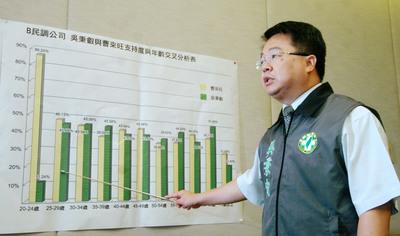
(1) On May 9, 2007, the Society for Truth and Light uploaded an audio. In this audio, the Society for Truth and Light Secretary General Choi Chi-sum recited questions 3 and 10 of the survey questionnaire about incest and bestiality in the February 2007 issue of the Chinese University Student Press. Since these contents have been classified as Category II: Indecent by the Obscene Articles Tribunal, this Society for Truth and Light audio is automatically Category II: Indecent as well.
(2) A Chinese University of Hong Kong theology student Wong Tat-wai published a commentary on page A20 of the May 7, 2007 issue of Sing Tao Daily and cited the contents of page 23 of the February 2007 issue and page 26 of the March 2007 issue of the Chinese University Student Press. Since these contents have been classified as Category II: Indecent by the Obscene Articles Tribunal, both Wong Tai-wai and Sing Tao Daily are automatically assumed to have published Category II: Indecent material as well.
(3) On page A07 of the May 7 issue of Sing Tao, materials from the page 23 of the February 2007 issue of Chinese University Student Press were quoted extensively. Since these contents have been classified as Category II: Indecent by the Obscene Articles Tribunal, Sing Tao Daily is automatically assumed to have published Category II: Indecent material as well.If the Television and Entertainment Licensing Authority is previously ignorant of these activities, it has now been informed by a mass campaign. If the Chinese University Student Press and Ming Pao are to be punished according to the law, so too must the Society for Truth and Light as well as Sing Tao Daily. In fact, all of them have to be punished equally if Hong Kong wants to have the rule of law. The maximum penalty is HK$400,000 and 12 months of imprisonment.
While this gives some sort of satisfaction, one must really ask whether it is necessary to build a culture of denunciation.
At Yangmei town, about 2,000 peasants surrounded the local population control office yesterday at 2pm and also beat a female cadre to death. "She was lucky to be able to flee to the middle school in the back and hide there." At 3pm, the angry mob poured gasoline and set the three storey office building on tire. "The fire raged for three-quarters of an hour. All the documents, cabinets and files were burned!" At least two police cars and many more motorcycles were also destroyed by arson. Next, the crowd proceed to surround the nearby town government office. Someone threw fire bombs at the building, but the police worked to make sure that the building did not catch fire. More than 300 police officers were present, and they were facing off against a crowd that reached 7,000 at its peak. After 5:30pm, the anti-riot police began to disperse the crowd. They rushed the crowd and swung their batons at everyone. Two police dogs were also released to bite people too. More than 100 villagers are said to be injured, with one unconfirmed death being reported.
At Lingshan town, more than a thousand villagers went to protest at the town government office and population control office to demand compensation for confiscated assets and damaged property. When the police tried to disperse them, they threw rocks and fought back.
At Licun, the clash between police and civilians was on a smaller scale.
Why were the villagers so angry? According to a villager interviewed by The Sun, the enforcement workers had gone to one household to seize assets. The villager had been making rice soup and the workers just dumped it on the ground. That has nothing to do enforcing population policies and everything to do with abuse of power.
[in translation]
... Here I want to use the experience of the Nutong Xueshe (note: a Lesbian Study Group) to discuss the system at the Obscene Articles Tribunal.
Earlier this year, Nutong Xueshe was planning an exhibit and they were 'advised' by the Home Affairs Department to send the materials to the Obscene Articles Tribunal for classification beforehand. Considering the fact that the exhibition date was approaching, that the Home Affairs Department was threatening to withdraw all its financial support and that Nutong Xueshe did not have money for legal fees, we had to comply. We even had to suppress the creative ideas of the authors and hide the "extremely disturbing" public hairs and pudenda ... (such as using the "banned" sign).
We inquired about the process of classification and the Obscene Articles Tribunal demanded HK$1,200 for each article. The entire exhibit had more than 40 items and so the total cost would be more than HK$50,000. This was two to three times the total budget of our workshop/exhibit. The Home Affairs Department told us that they would not provide us with additional funding for the classification process and we had to come up with the money on our own.
The Obscene Articles Tribunal/Home Affairs Department wanted us to send all the "troublesome" articles for classication, where they would be scrutinised completely out of context and totally oblivious of any artistic creativity. Instead, they will use a magnifying glass to mechanically see where public hair might be showing or where something looks like pudenda. They could not care less about artistic creativity.
Next, we argued to be able to do it the same way as the dirty magazines by putting the entire exhibit as photographs and texts on one single compact disc. This would mean that we only had to pay HK$1,200. After some argument, this was accepted. But since this was one payment for a basket of materials, the Obscene Articles Tribunal felt that their decision would also be given in one basket: namely, they told us that there were four 'indecent' words and therefore the entire exhibit was 'indecent.' Since the exhibit would be taking place in a public area, this meant that the event basically cannot take place.
This was just one week before the exhibit date. Fortunately, our student and volunteer workers spent a long time to negotiate with the Obscene Articles Tribunal and got them to write down just which particular article was 'indecent.' We were able to get back to the Home Affairs Department and the exhibit took place on schedule.
With respect to A Conversation With A TELA Bureaucrat, the government bureaucrat had suggested to Oiwan Lam to submit the photograph to the Obscene Articles Tribunal before publication. Oiwan Lam described the requirement as a calamity if this were a general principle for Internet publishing -- it is expensive (HK$1,200 every time that you want to publish something); it delays publication; it discourages distribution (i.e. hyperlinking by others); and it discourages individual intiative (i.e. when in doubt, don't publish).
A person in the Hong Kong legal community has asserted publicly in Ming Pao (http://hk.news.yahoo.com/070510/12/276r6.html) that one may be breaking the law if one merely put addresses of websites that contain obscene or indecent photographs onto the Internet for others to see. He pointed out that even if the persons do not upload the photographs, it does not mean that they have not broken the law beause they are indirectly "distributing" indecent maerial. The Internet audience may have to "take one extra step" but any "resolved" Internet user will able to see the photographs on those erotic pages.
Therefore,
I am complaining here against the company Google.com.hk for distributing indecent material at this hyperlink:
http://www.google.com.hk/search?q=sexBased upon the case KTCC3075/07, it is illegal to publish erotic hyperlinks and photographs on the Internet.
I have learned that the Yahoo! website has committed similar crimes and I urge you to investigate as soon as possible. The following are examples of web pages that are problematic for Yahoo!
http://hk.search.yahoo.com/search/images?p=nipple&ei=UTF-8&fl=0&pstart=1&fr=FP-tab-web-t&b=13
http://hk.search.yahoo.com/search/images?p=nipple&ei=UTF-8&fl=0&pstart=1&fr=FP-tab-web-t&b=1
http://hk.search.yahoo.com/search/images?p=makelove&ei=UTF-8&fr=FP-tab-web-t&fl=0&x=drt
===========================
Sir/Madame:
Thank you for you email.
Concerning the recent case in which a netizen was found guilty in court for distributing erotic photographs on the Internet, our office understands that this was a case in which an individual used a hyperlink to obscene photographs on overseas websites (servers) and directly displayed them on a local web page. This was more than just a hyperlink consisting of text and numbers. In addition, with respect to issue about the Yahoo! Hong Kong and Google Hong Kong search pages containing erotic information, our office is in the process of handling the matter and will get back to you later.
If you have any complaints about local websites distributing obscene materials, please send the relevant web pages and the email containing the complaint to the police (cpu-tcd@police.gov.hk) or our office (nrs@tela.gov.hk).
===========================
Your email dated May 18 has been received.
Our office is one of three government departments responsible for enforcing the Control of Obscene and Indecent Articles Ordinance (Hong Kong Ordinances, Chapter 390). We make determinations based upon the standards of the Obscene Articles Tribunal with respect to classifying articles. If we encounter any article suspected of carrying indecent material, we will refer the matter to the Obscene Articles Tribunal for classification. The Obscene Articles Tribunal has three categories of classification of articles: Category I (Neither Obscene Nor Indecent) articles which can be distributed to persons of all ages; Category II (Indecent) articles which can be distributed to persons 18 years or older after the conditions in the ordinances are met; Category III (Obscene) articles which cannot be distributed to anyone.
Our office has investigated and found that the website addresses that you complained about (yahoo.com, google.com) are not located in Hong Kong and therefore do not come under the <ordinances>.
If you have any questions about the <ordinances>, you are welcome to call 2676 7676 (Control of Obscene and Indecent Articles hotline) or email nrs@tel.gov.hk to inquire.
A Hong Kong man who posted a message with an internet link to an overseas pornographic website was fined yesterday for publishing an obscene article via the internet. The prosecution and conviction, the city's first under the Control of Obscene and Indecent Articles Ordinance, involved the use of a common computing technique, the police's commercial crime bureau said. The judgment has worried the local internet community, particularly with regard to possible constraints on the free flow of information. Questions were also raised on whether guidelines are sufficient to halt online distribution of obscene material.Woo Tai-wai, 48, pleaded guilty in Kwun Tong Court to publishing eight obscene photos via a local internet forum. He provided a linked message which, when clicked, would enable other forum users to access an overseas pornographic website showing the photos.
Deputy Magistrate Jason Wan Siu-ming fined Woo HK$5,000 in light of his guilty plea and clean record. He also said that while the articles at issue were obscene, they were not extreme or of deviant taste.
Now, let me explain to you why this case upsets me. If a society wishes to be priggish, then I don't have a problem with it even if I am just among the minority against a majority opinion. The truly upsetting part is that the prosecuted behavior has continued unabated. One and only case has ever be prosecuted at Uwants, even as the same activity goes unpublicized and unpunished at the same Uwants discussion forum. This is not about the rule of law. This is about prosecution when they have the attention and time to spare.
As evidence, I direct you to the Adult Area of the Uwants discussion forum. The time when I made this post was 1:38am on May 30, 2007. Here are some of the featured posts:
驚暴~(黑客破解)~台灣節目黑澀會美眉容瑄自拍的相簿圖片外流曝光*(第一手獨家) These are photographs from the famously hacked site of a Taiwanese girl with photographs of her frolicking with her boyfriend. This post has amassed more than 110,000 page views at Uwants.
勁多無知少女手機自拍★ A collection of photographs of nude young girls. Here is a comment: "Why is this poster not in jail already?" Don't you think that some of the girls could be under-age? This post has amassed more than 160,000 page views at Uwants.
Even if you don't understand Chinese, you can just click on the other links and get to the photographs. Nobody at the Television and Entertainment Licensing Authority is interested in these posts. Instead, they have the time to contact InMediaHK for the one photograph that appeared in this post: A Conversation With A TELA Bureaucrat (note: the only thing that mattered to TELA was that one photograph linked from flickr). (Further details at Comment 200705#100)
Ah, you say, if you proceed to the Adult
Area of Uwants, you will read this message: "LEGAL DISCLAIMER
WARNING: THIS DISCUSSION BOARD CONTAINS MATERIAL WHICH MAY OFFEND AND MAY NOT
BE DISTRIBUTED, CIRCULATED, SOLD, HIRED, GIVEN, LENT,SHOWN, PLAYED OR
PROJECTED TO A PERSON UNDER THE AGE OF 18 YEARS." Even if your eyes
aren't fast enough to read the message, it does not matter because the law has
been followed to the letter. Is this a joke? Does anyone care
about that message?
This does not resolve the question just why Woo Tai-wai was selected out for
prosecution. As I said, you can click on any of the links and compare
the photographs with the one at InMediaHK. Why is InMediaHK being
harassed and Uwants is rolling on nicely? The same occurs at other forums such
as Discuss.com.hk,
etc (for example, there are many more nipples at the Anhui
Girl's Self Portrait @ Discuss.com.hk than at InMediahk).
So what kind of job is the Television and Entertainment Licensing
Authority/Obscene Articles Tribunal doing?
(TVBS) In Taichung's District #3, DPP legislature candidate Hsieh Hsin-ni lost her primary election but she has filed an appeal on the grounds that one of the polling research companies had an improper business relationship with her opponent and this company gave her really bad numbers that resulted in her losing by 0.28%. (Comment 200705#094)
Yesterday, the office of Hsieh-Hsin-ni received a threatening letter which contained a bullet. The letter told her not to support DPP presidential candidate Frank Hsieh anymore.
Hsieh Hsin-ni had appealed to the Appeals Committee of five persons, of which three agreed that there was a procedure flaw in the selection of the polling research companies. But there was also no evidence of wrongdoing by that research company. The matter has been referred to higher levels. If the polls should have to be taken over again, then Hsieh Hsin-ni's current public campaign against the nefarious collusion between her opponent and the polling company will in fact be an unfair factor in the public's mind. That is to day, a poll taking back then and a poll next week will differ to the extent that the public has been exposed to blanket coverage of the public brawl. Oh, yes, it is also well-known that bullets can affect election outcomes in Taiwan.(TVBS) Late today, independent legislator Li Ao's office received a threatening letter with a bullet in it. The author claimed to be the leader of a criminal gang and he used foul to language to call Li Ao a coward who is taking money from Frank Hsieh. The writer also said that only Ma Ying-jeou can save taiwan.
(TVBS) On May 24, Taipei County Councilor Wu Shan-chiu was assassinated in this office by a lone gunman. (See Comment 200705#084). On May 28, a letter was mailed to Wu Shan-chiu office at the Taipei County Council. Inside, there was a bullet shell affixed with transparent tape. There was a written letter full of discontent directed at Wu Shan-chiu and it was signed under the name of Little Li Ao.
A writer for the website InMediaHK wrote an article on May 11 about the erotic page in the Chinese University Student Press and posted a photograph that showed the nipples of a female. The Television and Entertainment Licensing Authority received one complaint and contacted InMediaHK yesterday to advise them to either delete the photograph or add a warning message. According to the TELA person, failure to do so may result in the photograph being referred to the Obscene Articles Tribunal or directly to the police.
According to InMediaHK Oiwan Lam (who was the writer of the said essay), a worker at the Television and Entertainment Licensing Authority contact her to provide the advice of either deleting the photographing or adding a warning message. The photograph had not yet been forwarded to the Obscene Articles Tribunal. (Why is this point important? That is because TELA is making judgments on its own when that should have the job of OAT).
Lam said that the photograph was taken from the international photography site 'flickr' (see Nude and Captured) and was an art photograph around which the discussion was totally technical in nature. "It will not arouse immoral, obscene thoughts." Flickr itself has not received any complaints to have the photograph removed. Lam said that she will not remove the photograph, although the InMedia editorial board has not reached a decision yet. She said: "Whether something is a work of art should be determined subjectively instead of just counting how many naughty bits is being exposed."
The TELA spokesperson said that if they find someone who is potentially breaking the regulations, they will contact and advise the publisher to add a warning message. If the other part refuses, they will consider turning the matter over to the police for investigation.
The original essay is 查禁政治遊戲啟動 呼籲齊貼色情 hyperlink and the story of the conversation between Oiwan Lam and Mister Kong from TELA is 違反日常經驗的官僚/道德審裁.
Meanwhile, here is something else heading for trouble. The event is (via Ming Pao):
Hong Kong Open Body Arts Photography Competition Finals
Date: June 16, 2007, 3pm-7pm
Location: Sheungwan Cultural and Entertainment Center (Exhibition Hall)
Organizer: Body Arts Association
Admission: Free
Age limit: Seven years or older
Content: More than 300 nude photographs(Ming Pao) From Body Arts Association president Simon Cheung: "There is no need to set age limits for art works ... when the statue was declared incident years ago, the High Court said in the judicial review that it was stupid. We are not stupid and so we won't do any stupid thing." Specifically, this was a response to the question: "Will you submit the photographs to the Obscene Articles Tribunal for screening?"
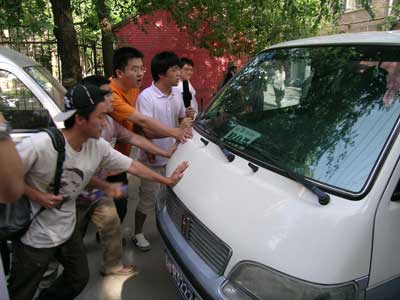
Q1. How satisfied were your with the experience of seven years after the first transition in the ruling party?
34.3%: satisfied
67.7%: dissatisfied
Q2. If you are dissatisfied, then what are you most dissatisfied about?
60.8%: economy
13.0%: public security
followed by cross-strait relationship; normalization of names; and foreign diplomacy.
Q3. If you are satisfied, then what are you most satisfied about?
26.8%: normalization of names
18.2% economy
followed by pubic security; cross-strait relationship; foreign diplomacy
Q4. On a scale of 0 to 10, how many points would you give President Chen Shui-bian?
0: 24%
1: 3%
2: 8%
3: 10%
4: 8%
5: 25%
6: 13%
7: 6%
8: 6%
9: 2%
10: 3%
Q5. What is the biggest source of chaos during the changing of the ruling party>
32%: the media
24%: President Chen Shui-bian
22%: the Parliament
5%: Lee Teng-hui
4%: Ma Ying-jeou
What do you mean by the independence of your newspaper? How would you define it in the spectrum of the Hong Kong media?
For some, independence means taking no stance. But we can't take this approach. Many media organisations have leaned towards Beijing, while some have become the voice of the government. It is natural for us to choose to balance this view in the market, rather than just trying to present a balanced view. By independent, I mean we are independent from the power of the government, the pressure of Beijing or the influence of the business sector.
What would you say to those who see you as coming under strong US influence and as part of the so-called anti-revolutionary force in Hong Kong?
They are entitled to their opinion, of course. But if they think we are subverting the government, this is ridiculous. We might voice more criticism of the government when it intervenes in the market or when it is not pushing hard enough for universal suffrage. But how do we subvert the government by so doing? We are just taking a stance. It is our role as a member of the media to supervise the government. The saying about US influence is not true. But do I share a lot of the values of the US? Yes. Democracy, freedom, rule of law: these are predominant values of today's world. They have become not just American values, but values that are shared by other parts of the world. There are people who go as far as saying I am a CIA agent. What can I say?
Do you think there are inherent contradictions in the way you run your publications? On the one hand, you uphold high-sounding aspirations such as democracy, but on the other, you also get a fair bit of criticism for sensationalism and questionable journalistic ethics.
We have to sell [copies of our publications] in order to get our voice heard. If we don't sell well, it is futile to take whatever stance we take. So, the primary objective is to sell. This will ensure our voice is heard by the people. We sometimes do go overboard. We have done things wrong.
But for all of these, we take the responsibility. We stand up to apologise for our wrongdoings, correct them, learn from our lessons and seek to improve. At the same time, you also need to take into account the fact that because of the stance we take, we have a lot of forces - overtly or covertly - working against us. Our rivals can do a lot of things to smear and discredit us.
Part 1: (Ming Pao via Yahoo! Hong Kong)
The China Affairs group of the Hong Kong Democratic Party ran a telephone interview of more than 600 respondents last week about the 1989 June 4th Tiananmen incident of army-citizen conflict and bloodshed. The results were:
- 80% believe the Hong Kong political parties must support the vindication of the June 4th incident;
- 53% believe that the incident was a democratic and patriotic movement;
- 40% believed that it was wrong for the Hong Kong secondary school textbooks not to mention the June 4th incident, including the suppresion by military force and the casualty figures.The Democratic Party's China Affairs Group pointed out that this survey shows that most of the people in Hong Kong insist on vindicating the June 4th incident and the educational material should record the history accurately.
Part 2: (Ming Pao via Yahoo! Hong Kong)
The march organized by the Hong Kong Alliance In Support Of Patriotic Democratic Movements Of China started off at 3pm from Victoria Park with 200 to 300 persons. At 5pm, the group arrived at Government Headquarters. The police estimated that there were 1,000 persons. The organizers estiamted that there were 1,500 persons. According to chairman Szeto Wah, it was not bad for 1,500 people to show up in bad weather.
This gets back to that old issue that makes the ESWN blogger so controversial. The majority of the people of Hong Kong (7 million in total and more than 4 million adults) believe that the June 4th incident should be vindicated as a democratic and patriotic movement. Yet when the Hong Kong Alliance In Support Of Patriotic Democratic Movements Of China calls for a demonstration in support for this cause, 1,500 or fewer showed up. Last year, the figure was around 1,100 (note: the police said 600).
What is the explanation for the discrepancy between 2.5 million (=60% of adults) and 1,500? What is the explanation? Has anyone ever told you why? You need to ask some serious questions about this organization. Some of the questions are as simple as: "What has the Alliance got to do with patriotic democratic movements in China at this very moment?" Are you aware of any such significant connection? Does the Alliance support/influence the rights defense movements in China? Does the Alliance affect public opinion about democracy inside China?
There will also be a candlelight assembly on June 4th and it will attract several tens of thousands people based upon historical figures. Why is there a difference between the numbers? Why would more people show up on a Monday evening (June 4th) than a Sunday afternoon? Once again, this is going to be a question about the Alliance which is apparently very uncomfortable to address. You can talk among yourselves.
The State "Anti-Obscene/Illegal Materials" working group issued two alerts about the illegal horror-genre publications such as <Death Note>. Following those instructions, authorities in Jiangsu, Shanghai, Henan, Guangxi, Xinjiang, Hubei, Sichuan, Chongqing and Guangdong have rounded up copies of the books and discs for <Death Note>. The current statistics are 2,409 copies of the book <Death Note>, 366 compact discs and 1,018 other illegal horror-genre publications.
Upon information, <Death Note> is based upon a Japanese comic in which the principal character came across a "death note" dropped by a God of Death. He discovered that as soon as he wrote down the name of someone that he wants dead into the notebook, it will become true. Following the popularity of the comic, Death Note books have become popular among elementary and secondary schools. These Death Note books can be purchased at various stationery stores. They have a black cover and every page inside has a round skull symbol in the corner. In the first twenty pages, there is a black piece of paper with the instructions: "All those who are noted down in this book shall die" and "if the name is written down and the cause of death is entered within forty seconds, the person shall die according to the described method." A Death Note book sells for 15 yuan per copy. According to store owners, the Death Note books are selling briskly.
Some students said that they bought the Death Note books only out of curiosity. Other students said that when they were frightened when they found out that someone had written their names in, even though they knew that nothing would happen.
What are they trying to ban here? 2,409 copies of the book? 366 CD's? Did they forget about the Internet? When I searched for 死亡笔记 on Baidu, I found 9.2 million results, which leads to all sorts of links including complete downloads of the comics, novels, movies, etc. If they meant to confiscate the prop copies of Death Note books only, then why the CD's?
DPP Legislator Kuo Chun-ming, who has won the primary in the Fifth Electoral District in Taichung County, yesterday described the just-concluded primary as "the most chaotic" the party has ever conducted. He held DPP Chairman Yu Shyi-kun responsible for all the disputes over the primary because the rules of the game kept changing as preparations for the vote were being made.
The biggest change was the introduction of the so-called "anti-blue" rule, which disregarded the opposition supporters' views in the public opinion survey that formed part of the criteria for the candidate selection. He questioned whether the change was not tailor-made for Yu himself, who was vying to become the DPP's presidential candidate. The "anti-blue" rule also applied to the presidential primary.
He said the proportion of people who refused to be interviewed hit a record of all DPP primary-related surveys, which the legislator said was a warning. "The DPP must learn the lesson, and contemplate whether the outcome of the primary really reflects the true spirit of public opinion polls," said Kuo.
The Lung Ying-tai Foundation invited Taiwan vice-president Annette Lu to have a two-hour exchange with Lung Ying-tai about human rights in Taiwan.
Lung: "The president's actions leave the international impression that he is a troublemaker."
Lu: "Wrong, wrong. You are mixing up cause and effect. I have to make this clear. Please do not ridicule him. If he were not the president, he would not be subjected to so much abuse. It is the international community which is blind."
Lung: "The serious situation was always there, it is there and it will be there."
Lu: "Oh, no. Sorry. Let me interrupt."
So Lung Ying-tai wanted to have her say while Annette Lu wanted to speak up on behalf of the president. Meanwhile, Lu had to cope with all the peculiar questions from the citizens who were criticizing President Chen Shui-bian.
Citizen: "The president wasted our money on international efforts. What did we get out of them?"
Citizen: "The humiliation on him was also humiliation upon us. But his position makes me want to disassociate with him. I don't want him to stand for the 23 million people, okay?"
Lu: "People don't live in paradise. Not everyone is a saint. Therefore, in this imperfect system, we want to give our courts a relatively detached space."Why is this item entitled "Lung Ying-tai PK BMW"? Because Taiwan vice-president was nicknamed BMW at one time. What does BMW means? "Big-mouthed woman!" She is also sometimes known as "IBM" (International Big Mouth). Before you get upset about these apparent abuses, please consider that maybe you have to take all this in stride. BMW and IBM can be take as complimentary instead of deprecatory -- unless you really don't get it. The alternative is to be meek and indecisive. So what is wrong with being BMW and IBM? There is no need to be so insecure.
Disgraced retired judge Miles Jackson-Lipkin and his wife, a former barrister, were released from prison yesterday after a judge reduced their sentences for welfare fraud. ... The couple, hidden behind surgical masks, left the Court of First Instance amid a throng of photographers. Gone were the wheelchairs used during their trial. The 82-year-old Mr Jackson-Lipkin needed the help of a correctional services officer and a walking stick as he left the court. His 81-year-old wife, Lucille Yun-shim Jackson-Lipkin, followed unaided.
But the local Chinese-language newspapers had much more to say than you ever care to know. Oriental Daily has a front page with the headline "Jackson-Lipkin gets out of prison to enjoy the world."
The Sun's front page has the headline: "The judicial process is dead."
Then there is a picture of Lucille Yun-shim Jackson-Lipkin getting her done (plus a dye job).
Finally, there is a picture of Miles Jackson-Lipkin's trousers falling down as he tried to enter the home of his sister-in-law.
Why is this last picture considered newsworthy (apart from the sensationlism)? Part of it is undoubtedly tied with the desire to see Miles Jackson-Lipkin humiliated. During his trial, he waved a card with the words 南蠻 (='southern barbarians') at the reporters. So there was probably some glee here.
The real news story here is that Miles Jackson-Lipkin had lost a lot of weight in prison. His old trousers are now too wide and that was why they fell off.
Chung To (杜聪) was born in Hong Kong but went to the United States as a very young student. He returned to Hong Kong after graduating from university and he had a very good job with an investment bank. During his spare time, he was involved in public interest projects and joined the Chi Heng Foundation. He was introducted to Dr. Gao Yaojie and he accompanied her to visit AIDS patients in Shengcai county, Henan province during the summer of 2002. He saw the large number of new graves, the suffering AIDS patients and the AIDS orphans who could no longer attend school because their parents were dead. Chung To was shocked. He gave up his investment banking job and he dedicated himself full-time to help the AIDS orphans.
When school began in autumn 2002, 127 elementary/secondary school students in one village in Shengcai county were able to continue school because Chung To paid their tuition fees. In total, Chung To's foundation has assisted 6,000 students in four counties in Henan provinces, as well as Anhui and Shandong provinces. During the past five years, Chung To has spent all his personal savings in charitable work and he is forced to become an investment banker again. In 2005, Chung To was named as an outstanding Hong Kong young person. In 2006, he was named as an outstanding worldwide young person.
The above was the good story. Now for the bad story. In the summer of 2006, Chung To organized certain university students from Shengcai county to return to work as volunteers. On August 6, the Shengcai police summoned one of these university students to the police station for questioning. They informed the student that Chung To's Chi Heng Foundation was an illegal organization. At past midnight on August 9, the Shengcai county police went to the home of Chung To's assistant in Shengcai and made her go back and open the office so that they could take away the two computers with all the data. They left no warrant and no receipt.
When school began in September, the county had not renewed approval for Chung To to continue paying for tuition. Several dozen parents and students went to petition but some of them were arrested. The government said that these petitioners disrupted social harmony when they only wanted to get the government to allow Chung To to continue to pay for tuition.
In October, the Shenchai Civil Affairs Bureau's Charity Association contacted Chung To and asked him to transfer his planned donation into their bank account to be distributed to students. Chung To refused. He has never ever distributed financial aid through a third party. He has always personally delivered the money to the students. In the end, Chung To proposed to work with the Charity Association by handing the money over to the students together. Shengcai county rejected the proposal.
When Chung To attempted to visit the petitioners, he was stopped by the police at the village entrance. Chung To said: "I have friends in the village that I want to visit. I have been keeping very quiet about this whole thing. But how can you deprive me of my right to visit friends?"
When YZZK contacted Shengcai county party secretary Li Haizhou, he said: "We welcome charitable activities in Shengcai, but you must go through the procedure and get approval from above to work with the Civil Affairs Bureau's Charity Department. Otherwise, I have difficulties." He emphasized that he was just following the orders and policies from above. The public security bureau will suppress all unregistered NGO's. Li Haizhou said that overseas NGO's help this family but not that one and this creates squabbles among families. "Our work is very hard."
In truth, over the past five years, Chung To had signed agreements with the Shengcai county Department of Health and Department of Education. He has government approval and he has red-lettered government documents. He keeps his promises to the government. Even when he raises money, he does not mention Shengcai specifically. In order to make practical contribution, Chung To has been exceeding careful in not offending the government.
Chung To is careful about describing the nature of his task: The blood trade was the cause of the AIDS disaster. "There has been a fire and I am the firefighter who is helping the government fight the fire. I am not here to investigate the cause of the fire and hold people accountable. That is the reason why many government officials are willing to accept us and help us." But let us suppose that the fire was accidental and there are people willing to help fight the fire. Instead, the government obstructs them from doing so. Then that is another story.
So far, more than 400 high school and university students have still been able to receive their tuition fees. Chung To had set up bank accounts for them and he wired the money directly into their accounts. "Although the government took away the computers and data, we had backups and the government cannot obstruct us from helping those AIDS orphans from completing their studies." However, the middle- and elementary- school students have not received their tuition fees yet.
Why is Chung To being so stubborn? Five years ago, Chung To made a promise to the deceased AIDS parents that "their children shall receive a good education." Chung To's message to the government officials is: "I did not come here because of you, and I definitely will not leave because of you."
What should Chung To and the Chi Heng Foundation do next?
" (note: it is literally "apricot plus orange" but it is the homonym to "May your entire family perish") during an argument, and this is obviously an attempt to curse people, but if you say that "Your dress today combines apricot color with orange color (杏加橙) and it looks really nice," then you should not have a problem.In a move that caught many legislators by surprise, proposed by-laws for the new unified KCRC and MTRC lines include a suggestion that the penalty for the use of foul language be increased from HK$2,000 to HK$5,000 plus six months' imprisonment. The fine for loitering, busing or transporting pets would also be increased from HK$2,000 to HK$5,000 plus three months in jail.
...
Other important changes in the by- laws include:
- a maximum fine of HK$2,000 for queue jumping;
- HK$5,000 fine and six months' imprisonment for unauthorized structures;
- HK$5,000 fine for the wrong use of ticket-vending machines;
- HK$5,000 fine for failure to obey directions inside a train carriage;
- HK$5,000 fine (formerly HK$2,000) for placing feet on seats;
- HK$5,000 fine and six months' imprisonment for causing a fire hazard;
- HK$5,000 (formerly HK$2,000) fine for playing a musical instrument or radio or cassette recorder;
- HK$5,000 (formerly HK$2,000) for taking on board prohibited items;
- HK$5,000 (formerly HK$2,000) for entering or exiting by improper means;
- HK$5,000 (formerly HK$2,000) and six months' jail for soliciting, and soliciting for handling goods or luggage;
- HK$5,000 (formerly HK$2,000) and three months' jail for displaying unauthorized materials or loitering;
- HK$5,000 (formerly HK$3,000) and six months' (formerly three months) jail for flying objects endangering operations.For your edification, here is some expert legal advice from Apple Daily:
Q. If I swore in Chiuchow or some other foreign dialect/language, would I be breaking the law?
A: Swearing in some other dialect/language is basically breaking the law. But the important thing is that language ought to be understood by other who take offense, and then prosecution may be effected.Q: Can I use homonyms of dirty words instead?
A: The By-laws do not care whether your words are dirty, but they are concerned if your language attracts attention from and disturbs/offends others. For example, a passenger may use "杏加橙
Q: Would an obscene
hand gesture run the risk of being prosecuted?
A: It depends on whether the other party understands the meaning of the
obscene nature of your hand gesture. It also depends on your intention.
For example, everybody knows that raising the middle finger is an obscene
gesture. But if you raise your middle finger to show an injury, it is
not against the law.
Q: If I am speaking to
a friend via the speakerphone on my mobile phone and the other party uses foul
language, am I responsible?
A: No, you are not the person who used foul language.
Q: Are obscene ring
tones against the law?
A: Although you did not have the intention to curse someone, you are on the
edge of legality. As long as someone feels that public order has
been disturbed or feels uncomfortable, you can be prosecuted.
Q: Can I be prosecuted
for wearing a t-shirt with foul language printed on it?
A: Everybody has the right to choose what they wish to wear. But if
someone else feels offended, you can still be prosecuted.
Q: Is it against the
law to curse in the streets (note: outside of the KCR/MTR subway system)?
A: There is no law specificially against the use of foul language. But
if someone feels that your words have disturbed public peace, you can be
prosecuted under <Public Safety Ordinance Article 17b> about disturbing
public order. If convicted, the maximum fine is HK$5,000 and one year in
prison.
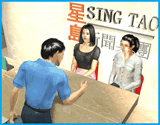

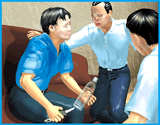
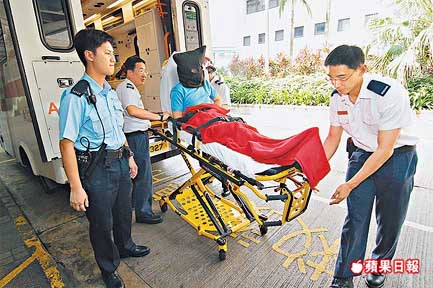
Q: As a writer, you are very much involved in political commentary. Are there negative consequences? Some people may think that your long-term professional research are on literature and sociology, often serving as the voice of conscience for writers. Are you out of your depth in complex political problems?
A: I have two identities. One is a writer. The other is a citizen. I never claimed to be a Sinologist or a China research specialist. At the start of today's speech, I emphasized this point. I am not a political scientist either. I don't care about the political scientist's methods and viewpoints about some matter. I am writing from the viewpoint of a writer and a citizen. In a diverse and open democratic society, I write my thing and you write your thing, and the readers can choose for themselves. Conversely, I have never demanded the scholars to write according to my way. I am therefore no different from the scholars in my position.
Q: Many of your readers are your admirers and treat you as a guide and authority in matters of life and literature. You have now entered a highly controversial area. When you enjoin a political topic, should you have the political responsibility on account of that authority instead of simply treating yourself as a person exercising her free speech?
A: No. As a writer, I don't think about how my so-called authority might influence this or that at all. The only things that I am responsible to are my conscience and my words. I only consider whether I have used the best words to express my ideas. I do not consider the tangential issues that you talked about. Just as I do not expect that the government should be responsible for me, I do not think that I should be responsible for any reader because the readers have to be responsible for themselves. I can only responsible for my words, my observations, my thinking and my conscience. When I have passed my self-examination on these principles, the essay shall be published. It is your own choice whether you accept it, whether you treat it as authoritative, whether you completely disagree with it, or whether you did something as a result of agreeing with it.
Indeed, I am familiar with the situation. I have been told: "Yours is an authoritative website and therefore you cannot stake out one position (as opposed to others) because your influence is too great." You might just as well as plug in Lung Ying-tai's response for mine: "In a diverse and open democratic society, I write my thing and you write your thing, and the readers can choose for themselves."
I have also been told: "You should just stick to translation because you are clueless about these complex issues." I did not think that when I undertook to run this website, I had waivered my individual right to exercise freedom of speech. In a diversified, open and democratic society, my views (however misguided and clueless they may be to some people) should be available for all to read and to decide. Lung Ying-tai wrote: "I can only be responsible for my words, my observations, my thinking and my conscience. When I have passed my self-examination on these principles, the essay shall be published. It is your own choice if you accept it, or if you treat it as authoritative, or if you completely disagree with it, or if you did something as a result of agreeing with it."
There may be some resentment against my use of the large number of Chinese-to-English translations to corner the market and then impose my personal views on my unsuspecting readers. But if this is so obvious, what is there to stop anyone else from doing the same? Besides, this is an insult to the intelligence of the readers. If they are intelligent enough, they should be able to see through my 'ploy.' If they are too stupid and need to be guided by some other self-appointed elite superior intelligent beings, then maybe an open and democratic society is not needed after all.
Let me summarize it this way. The fact is that Lung Ying-tai is a popular and esteemed figure in Chinese communities all over the world. Nobody else can even remotely reach that status level. You can spend your time trying to say that she is a misguided fool, an undercover agent provocateur or a faux democrat, etc. Or else you can spend your time figuring why she has that kind of global reception. I assert that the answer to the latter question is much more interesting and substantive than the first question.
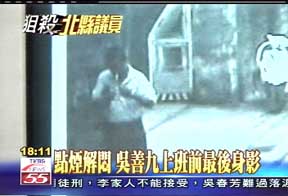
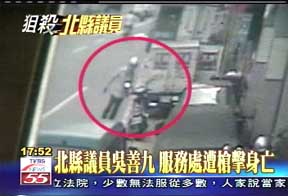
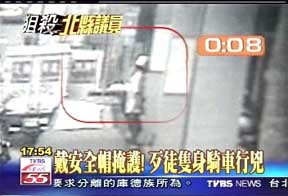
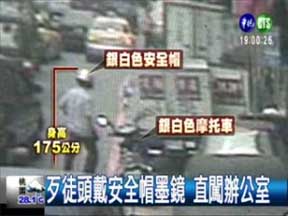
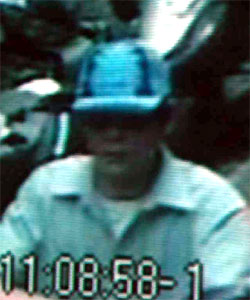

[in translation]
Seventeen years ago, professor Tu Weiming organized a conference in Hawaii and invited a dozen or so star China-based American correspondents and a few scholars to attend. I was fortunate to be there and I heard some high opinions. An academic senior person launched the attack by saying that he cannot imagine any other country would dare to send a non-English-speaking correspondent to work in the USA, but the USA was sending non-Chinese-speaking correspondents over to cover China. This was stepping on a land mine, as the star correspondents were dismayed and embarrassed. They looked at each other and did not know what to do.
The correspondent from Baltimore Sun came to the rescue with a long and slow discourse: Bewilderingly, his sister had married a correspondent. Bewilderingly, this brother-in-law correspondent was dispatched by the New York Times to Moscow. Bewilderingly, he was there during the attempted coup when the rebels bombed the parliament in which Gorbachev was hiding. Finally, Yeltsin saved the day with a rousing call even as Gorbachev's political career was finished. The brother-in-law worked day and night on this story. Afterwards, the newspaper rewarded him with a 'rest' of one year in Germany as compensation. Bewilderingly, when he got to Germany, he encountered the fall of the Berlin wall. Thus, bewilderingly, he wounded up with the Pulitzer prize that year.
After tossing out so many 'bewilderingly', the correspondent from Baltimore Sun winded up the story slowly: "My brother-in-law does not speak German." That was a sharp and nice repartee.
In the 1980's, a certain female correspondent with The Wall Street Journal was neither a China expert nor a good Chinese speaker, but she was one of the best reporters covering China. Later, the China expert Harry Harding introduced her to me. She was very perceptive and unique. She knew that she was no expert, but she was prepared to work diligently. Humbly and patiently, she consulted experts in various fields. Meanwhile, her peers with Harvard education were superficial and partial by comparison.
There are always exceptions and some people get lucky. In the end, one would still have to go about the work on the basis of expectations. What has worked in the past may not work again. The New York Times does not ordinarily assign a non-German speaker to Germany; but a German-speaking correspondent may not chance across the fall of the Berlin wall and will most likely not receive the Pulitzer prize.
In the 1980's, the foreign correspondents stayed at the foreigners' compound which locals cannot enter. Wherever the foreigners went, the public security people would follow and 'protect' them. Extracting information from the Chinese officials was like making a stone bleed. But today, foreign correspondents can live and walk around anywhere in Beijing. Periodically, they can even visit a Henan AIDS villages. Times are different and if your Chinese language skills are not good enough, you should not be making a living in China. There are some foreigners with perfect Beijing accent, including fluency in the gangster talk of the young hooligans, because once upon a time they had eaten the crappy food at the Peking University cafeteria and lived in the threadbare dormitories of the Chinese students.
It is hard to report on China if your Chinese-language skills are not good, but fluency in Chinese does not guarantee good reporting. We have taught in the USA before and we have the experience of fighting with the English language. We want so much to be English-speaking cosmopolitanists. Being cosmopolitan is particularly easy in Hong Kong, since "colonization" is apparently the same as "internationalization" and confers a natural privilege. When people possess that privilege, we will tolerate them to be pleased with themselves as long as they are not too overbearing. In Hong Kong, you can cling to your copy of <South China Morning Post> and become a China expert. In the USA, can someone who familiarize himself with what is in the Chinese-language <World Journal> and become an expert scholar about the USA? If you try to make that analogy, you will probably end up being very angry. Such as fate, just as Deng Xiaoping cautioned Li Peng about the ascension of Jiang Zemin: "Do not refuse to accept it." If you get used to it, it becomes natural.
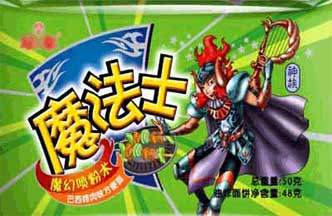
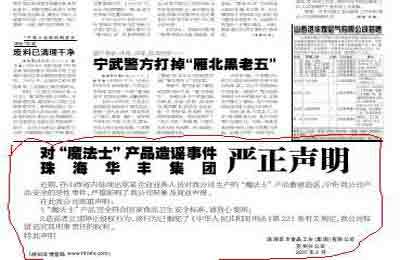
The war over the "Memorial Hall" escalated yesterday. True to his word, Mayor of Taipei Hau Lung-bin had a resolution on the renaming of Ketagalan Avenue adopted by his municipal council and proclaimed it "War on Corruption and Democracy Plaza." He promised Monday to rename the shortest avenue in Taipei, which used to be known as Chieh Shou Lu or Chiang Kai-shek Longevity Road before it was changed to Ketagalan Avenue in 1996 by Chen Shui-bian, the then mayor of the capital city. Ketagalan is the name of the indigenous tribe who inhabited much of the Taipei basin before Chinese immigration began in the seventeenth century. The tribe was totally assimilated.
Like a general fighting a complicated battle, Hau held the press corps at the municipal government for more than one hour to prevent his plan being leaked, while quietly getting everything done to start removing the two giant banners covering the north and south sides of the former Chiang Kai-shek Memorial Hall. His troops were deployed at 9 a.m., almost at the same time Hau called his municipal council to a special session to declare a new war against the name rectification campaign spear-headed by President Chen Shui-bian.
Unlike the president, Hau had no difficulty proclaiming War on Corruption and Democracy Plaza. The mayor needed no legislation to make the name change that points an accusing finger at President Chen. First lady Wu Shu-chen, indicted on November 3, is standing trial for corruption. President Chen was not indicted, for he is immune against prosecution, but was considered an indicted co-defendant who will be formally charged on leaving office.
Chen was not that lucky. He wanted to drop mention of Chiang Kai-shek from the memorial hall, but its organization is legislated. A change in the name can be made only after the Chiang Kai-shek Memorial Hall act is duly amended by the Legislative Yuan, where the opposition alliance of the Kuomintang and the People First Party has a majority of two. That's why Chen had his minister of education Tu Cheng-sheng downgrade the status of the memorial hall in an attempt to make it unnecessary to propose an amendment. It didn't work. Eager to carry out the presidential order, the government renamed the memorial hall and put up a new name tablet, which Chen unveiled last Friday. The two giant banners, emblazoned with wild lilies, were hung over the sides of the building to proclaim it the National Taiwan Democracy Memorial Hall."
Lee Yung-ping, Taipei director of cultural affairs, arrived with her workers and tore down the banners in 30 minutes. The operation started at 10:30 a.m. It was the time Hau had the press corps informed the banners would be removed. A couple of hours was needed to remove a scaffold from which a huge canvas was hung to cover the name plaque of the Chiang Kai-shek Memorial Hall. The entire operation was completed without a hitch.
That irked Tu Cheng-sheng. An irate Tu described the operation as an "act of violence." "Violence isn't good," he said and refused to answer press queries about what action his education ministry, which is in charge of running the memorial hall, is planning to take in retaliation. Tu's vice minister Chou Tsan-teh gave the answers on his behalf. "We did nothing against the law," Chou repeated. But Lee Yung-ping pointed out the education ministry violated the cultural asset preservation act and the advertising law by hanging of large banners and putting up the scaffold.
On May 18, at the opening cermony of the Hebei province Science/Technology Activities week in Gaocheng, a student passed out in the heat as the speeches of the leaders went on.
On May 20, the relevant leaders had not yet arrived to address the Kansu Provincial Speech/Hearing Rehabilitaiton School students. The two dozen students had been standing in the blazing sun for more than two hours already. So the teachers gave each student a newspaper to cover themselves.
On May 9, it was fifteen degrees in Yinchuan, Ningxi. The various leaders at the inaugural Xingqing district elementary school sports meet went on and on with their speeches. The 400 female students waiting to perform in the opening ceremony had to shiver in the cold for almost one hour.
... The county party/government demands that all public servants in the county to personally accomplish two goals by August: (1) get one person (male/female) to undergo sterilization; (2) collect social childcare fees of 500 yuan or more.
... Since early February, the cadres at the county, town and village level have blanketed the area to enumerate the population and update the family planning database. This will allow the pregnant women who have violated the family planning policy to be made to "wear an IUD after the first extra child" and "be sterilized after the second extra child." Any female who fails to show up for inspection will be fined 1,000 yuan. Against the individual families ("nail houses 钉子户") or pockets of resistance ("dead corner villages 死角村"), there will be a massive show of force.
... Concerning the situation in which the target persons in Jiangning town have been fleeing over the reservoir area to go into hiding, the government employed 24-hour-a-day boat patrols and have intecepted 252 persons who then had the relevant family planning policies carried out on them. Concerning the illegal elements retaliating against the family planning workers in Yingqiao town, more than 300 police officers were sent in to surround the town and arrest 13 persons. ... Concerning the failure of certain cadres to carry out their assigned duties, 104 cadres have been expelled from the party and relieved of their public offices.
... So far this year, the county has spent more than 12 million yuan, mobilized more than 200 vehicles, made 4,663 permanent banners, erected 182 large-sized billboards and distributed 305,000 publicity flyers. According to statistics, as of April 24, the county realized 17,268 instances of the "four methods 四术" (IUD, sterilization, induced abortion and surgical abortion) and collected social childcare fees totaling 7,881,000 yuan.
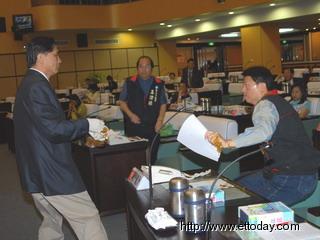
At just past 2pm on May 14, the 150 plus workers of the Songwang town Social Childcare Fee Forced Collection Work Group were requisitioning fees from the "nail house" owner Chen XX in Fushan village, Dongping town because Chen had exceeded the family planning quota. The workers toiled for more than 2 hours under the blazing sun. Town cadre Li Chunjun had a heatstroke and fainted. Colleagues immediately put him inside a car and took him to the Dongping Health Clinic for emergency treatment.
When the Bobai county party secretary Su Jinzhong and the county mayor Huang Xiaoming heard the news, they immediately ordered that the best doctors and medicine be used. But the patient had been working under the high temperatures for a while, and it triggered a stroke. So the patient was sent to the country People's Hospital emergency room. Su Jinzhong and Huang Xiaoming personally called the hospital to ask that the top doctor be assigned to the case After more than three hours of effort, the patient regained consciousness. On May 16, Li wanted to return to the family planning work group to continue working. Su Jianzhong and Huang Xiaoming instructed the local party and government that Li should be allowed to rest until his full health is restored.What work did the Family Planning Work Groups do? From a forum post at Boxun:
On May 11, Lin Dong was feeding the pigs belonging to his cousin. There were 32 pigs which were ready to go to market next month. Suddenly, several trucks came to the village. When the villagers saw the trucks, they screamed and fled. Lin Tong could not do because he had to look after the pigs. About one hundred people came down from the trucks and began kicked down doors. When they reached the pig farm, they began to haul the pigs away. Lin Tong tried to stop them, but the sticks fell down like rain on his body. All 32 pigs were taken away.
On May 15, Liu Qingyi opened up his grocery store for business. Suddenly, he realized that there were a dozen people standing outside. He tried to shut the door but it was too late. The men rushed in and began hauling away everything in this store. Then they used to tools to pry out the newly installed anti-theft door. They even pried out the aluminum windows in the store. Liu was left with four barren walls with holes in them and a floor littered with plastic bags.
Here is a photograph of the aftermath of a fee collection exercise in another Guangxi county.
As an aside, I am a blogger who reports from the mainstream and Internet Chinese-language sources. Given the amount of intentional and unintentional lies that have been put out there, how do I know whom to trust? I have no magic rule, beyond instincts that were acquired over time. Perhaps calling it instinct is not totally fair, because it is more about certain telltale details in the original reports. The Bobai Mass Incidents was based upon the report filed by Oriental Daily/The Sun. However, the same story appears in other Hong Kong newspapers Apple Daily, Ming Pao, Sing Pao and Sing Tao. None of the newspapers had reporters on the ground; however, each of them telephoned different stories to confirm aspects of the general story. To my mind, this makes for a credible story which has not appeared in either Chinese- or English-language mainstream media at the time when I did the translation. I am less confident about the Boxun forum post, and I treat it as anecdotal rather than factual.
Addendum (05/22/2007): (Apple Daily) On the day before yesterday, when Bobai is searched in Baidu, there were several dozens of web pages about the clashes in Bobai, including text and hpotographs. Some of those were re-posted at the discussion forums on the large portals. By yesterday, all of the information was deleted, including netizen comments, analyses and messages of support. Meanwhile, the Bobai incident is completely missing in Guangxi Daily, Yulin Daily, Xinhua agency and even the Guangdong newspapers.
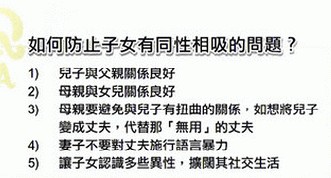
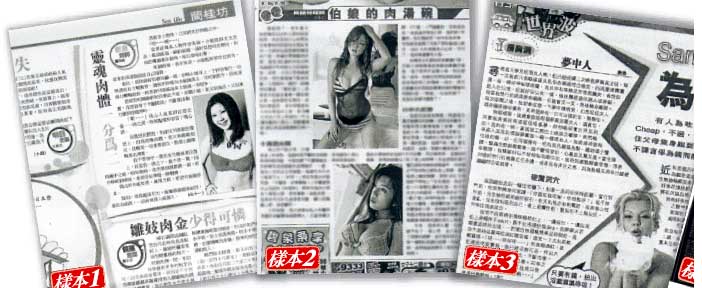
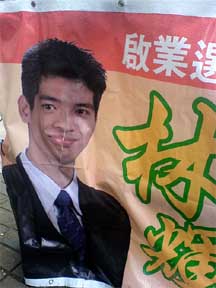
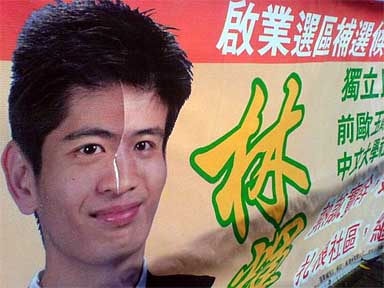
More than 1,700 people have complained to Hong Kong regulators that the Bible is overly sexual and violent, apparently to mock a recent ruling condemning a sex survey in a student newspaper.
In other words, the outside world got the idea that the purpose of this Bible campaign was "apparently to mock" a ruling by the Obscene Articles Tribunal. Do you get it? It was mockery, sarcasm, wit and all that.
Unfortunately (and that is really unfortunately), in Hong Kong, some people did not get it and called the campaigners (see Pandemonium (in Chinese)): 無知、幼稚、無聊 (translation: ignorant, naive and senseless). Oy!!!
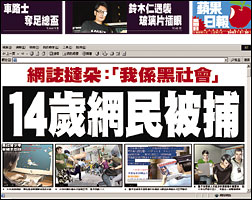
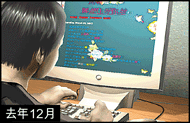
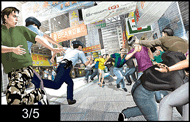
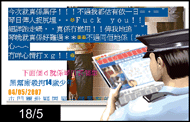
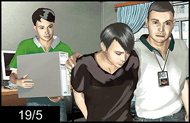
好撚火"
今日真係好撚唔鋸 "凸"
洛去學校個邊,接我d靚仔洛山景找呀哥""
洛到去都好開心,我同肥橙個d去廁所啦
去完出番黎坐,坐都未坐好
有四個反黑過黎{豆}尻我地啦!!!
我企得好撚串,俾個呀sir{係咁屌!!老母都屌埋}
跟住我個樣就好唔撚鋸咁對住佢!!
呀sir話叫我同佢去廁所,話要打尻我喎!?
跟住有個呀sir走埋黎話上去天台咪得囉
我咪跟左班呀sir上去,上撚到去就真係慘洛"凸
四個呀sir係咁屌尻我,打尻我!!又問我跟邊個,識唔識肥仔見呀...等等!??
我話唔知姐,有個呀sir打尻我個頭!!!個時幾撚火呀,又唔打得佢地喎
叫我[徐]對鞋出黎,我咪徐囉﹏
佢放左[包野]洛我對鞋到,跟住話尻我身上有毒品,
叫我番差館等你老母拿[擔保],擔保你啦!!
有個呀sir走埋黎,話:算啦,叫我講d好聽d既野喎,咪放你走!!
跟住仲有好多煩野﹏唉,,仲有好多野會搵我
反黑叫我番屋企,我理佢都傻啦,,
我叫埋我班靚仔上呀哥屋企!!!
12點幾番泥圍,有個靚仔係泥圍陪到我2點幾先番屋企!!
真係無撚奈"凸凸凸...
仲話反黑會再打俾我喎﹏真係煩,,仆佢個街[in translation]
I'm fucking angry!
things went really poorly today 凸 (note: this is the icon for a raised middle finger)
I went down to the school to get my kids to go down to Shan King to see Brother Ni!!
I was happy to get there. Fat Orange and I went to use to the restroom
when we came out, we did not even have time to sit
when four Anti-Triad Squad policemen came over to mess with us!!!
I stood there with a bad attitude and that 'sir' started to curse me (including my mother)
so I gave him an unpleasant look!!
that 'sir' then said that he wanted me to go to the restroom with him and he will fucking beat me up!?
then another 'sir' said that it would be easier to administer the beating on the roof
the four 'sir's cursed me and hit me!! they asked me whom I work for, whether I know Fat Guy Kin ... and so on!??
I said that I don't know, and one 'sir' hit me on the head!!! I was fucking angry, but I cannot hit them
then they told me to take off my shoe. so I took off my shoe.
they put a 'bag' inside my shoe and then fucking said that I had drugs on my person,
they said that they would take me back to the police station and my mother would have to come to 'bail' me out. bail you out!!
then one 'sir' came over and said: "forget it. just tell us something good and we will let you go!!
there is going to be trouble in the future. we are going to look you up for other things."
the Anti-Triad Squad police told me to go home, but I ignored them,,
I told my kids to go to Brother Ni's home!!!
we went back to Nai Wai after midnight. one kid stayed with me at Nai Wai until I went home after 2am!!
there was really nothing that I can do about this!! 凸 凸 凸 ...
the Anti-Triad will call me back. this is so annoying,, damn them.
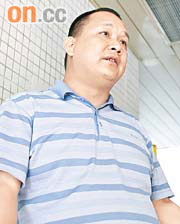
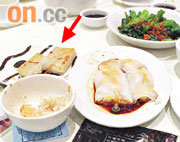
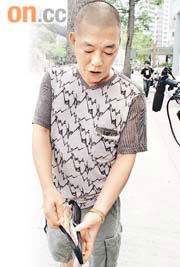
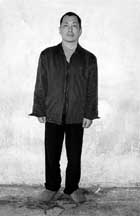
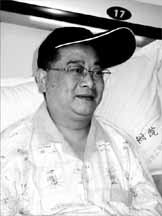
Q3. Have you ever imagined making love with your father, mother, brother or sister? (It does not matter whether it was when you were young or now)
Answer 1: Not at all.
Answer 2: Not with my parents. I once masturbated while my younger brother was at home. For one instant, I imagined what would happen if I made love with him. But it was a flash and I did not try to imagine the process. I might have felt that it would be too trouble making love with him and so I did not think about it anymore.
Answer 3: I really haven't thought about it.
Answer 4: I've never tried because I don't think their bodies attract me. But I have imagined how my parents made love. I have imagined making love with other relatives. And I actually made love with one relative. At the time, I only felt that it was someone I liked and it didn't matter whether it was a relative. Later on, some other relatives began to get suspicious (they did not know that we went to bed, but they must suspect that something was going on between us) and they broke us up. Why did they break us up? What is the problem with incest? This is stupid!
Answer 5: I have really never thought about it.Q10. What kind of animal would you like to make love with most of all?
Answer 1: I cannot come up with anything.
Answer 2: I only want to make love with humans.
Answer 3: A woman.
Answer 4: From when I was young, the animal that I have come into contact with most often is the human. I have not spent any time with other animals and I don't want to make love with them. Oh! I once accompanied a friend to a horse riding venue in mainland China. I did not dare to get on the horse so I just walked around. I suddenly spotted a horse -- we looked at each other. Then I saw that it got an 'erection'! Stupid! It was huge! The erection rose up bit by bit until it got very big. Then the horse showed its teeth to me. It was very strange, but the horse showed its teeth to me. Its teeth were dirty. Later on, I was moved at the idea that it got an erection when it saw me (a long time afterwards, I thought about it and I was sorry that I did not smile back at the horse).
Answer 5: It is so dirty. You can catch all sorts of disease.In making this translation of materials that have already been classified as Category II Indecent, I also run the risk of being denounced to the Television and Entertainment Licening Authority and be subjected to a maximum fine of HK$400,000 and 12 months in jail. If you want to join the crowd that does not believe the punishment fits the crime, you can also copy the above and post in on your website as a badge of honor.
Postcript: You don't even have to copy-and-paste to your website. Just a hyperlink to this item will land you into trouble with the Hong Kong police based upon that precedent case in which a man was sentenced to 3 months in jail for hyperlinking to some obscene photographs.
[in translation]
I was watching news at noon on the day before yesterday. The screen was suddenly blanked out. I had no idea what was going on. I came back at night to watch the news program again. It did not matter if they were going to show only 0.01 second of it because I will know immediately what it was. The hard work was rewarded because there was one second of it. The news was about DAB's Ma Lik. That made it a lot easier to look up and I found the detailed report: here.
He used the scientific approach to challenge the story about Liu4 (note: this is the abbreviation for June 4th) as being exaggerated. He said that tanks cannot turn people into meat pancakes; if you don't believe it, you can try it on a pig.
This sentence aroused mass anger, and his political career may well have been terminated.
[in translation]
Mining disasters are the best points of entry for observing China. At each mining disaster, big and small leaders show up and talk in completely politically correct ways. They make their positions known, they incite the public, they make angry denunciations and they have fool-proof countermeasures. Their poses, steps and tones are flawless as if they were being directed by Zhang Yimou. When you first hear that, you might feel that the mine workers was unobliging by dying so readily and causing trouble for the leaders.
... When a person wields power, he will use the most efficient way to obtain the maximum power. If he can get away with talking, he won't do anything else. At most, he will spend some time working on his rhetoric. To be pessimistic, one should let the officials talk until they run out of steam and even get embarrassed. Then something real might happen.
But a more persistent person might ask me, What happens if the officials are too thick-skinned to ever be embarrassed? What to do? I say that this is at least better than saying disgusting things. They can seal up the scene of the disaster, ban all media coverage and then hold a press conference to announce that China has the safest coal mining industry in the world -- that could make people feel even worse, right?
When officials learn to talk nice, or even come up with catch phrases for the media to use as headlines, the optimistic view is that this shows that public opinion is effective. When the people are allowed only to follow orders, the officials will be arrogant. When the people are independent judges of values and refuse to accept the official story automatically, the officials will be humble.
According to Hunan media, the government there wants to turn Internet opinion into a tool for supervision and monitoring. The leaders of dozens of departments will appear from late April to late June on the Internet to explain to the netizens about how they are absorbing the 11,000 plus "good ideas about the development of Hunan submitted by netizens all over the world." Why are they doing this? Because "you can shut one reporter up, but you cannot shut all the reporters up; you can shut all the reporters up, but you cannot shut all the netizens up" -- the people (especially netizens) like to hear these words, but it remains to be seen whether the Internet posts and blogs by Hunan people will get deleted.
But as someone with minimal demands, I can have a good time. At least in the fields of news and Internet, I see that officials are beginning to learn Mr. Zhao Tiechui's speech manners. The netizens obtained the right to criticize and even became the ultimate reason why mouths could not be shut up. This is a lot better than being previously regarded as virtual mobsters who are the source of chaos. At least, their reputation has been restored.
Of course, the increasingly mature netizens know that they don't have to thank anyone for restoring their reputation. Officials are beginning to study their thinking and learn new ways of talking because of the impossibility to completely wipe out all the criticisms from the netizens. When you can't beat them, you join them. From this viewpoint, even the weakest criticisms are useful because they are be aggregated to form an unstoppable force of public opinion that will make the officials say the right thing and -- if possible -- even do the right things.
The Ming Pao editorial agrees that the Bible should not have been sent to the Obscene Articles Tribunal for classification. However, it believes that the reason offered by the Television and Entertainment Authority is wrong. The power to determine whether an article contains indecent or obscene elements and whether it has violated standards of morality, decency and propriety generally accepted by reasonable members of the community belongs solely to the Obscene Articles Tribunal. TELA is merely the 'secretariat' for the Tribunal and is not empowered to act in its place. In this case, TELA should have invoked its administrative power to simply declare that the complaints against the Bible were "vexatious and frivolous" and be over and done with. Instead, by going beyond its power, TELA has now opened the door for a judicial review.
In any case, the 'assault' on TELA will move on to other areas. Several other prospects have been mentioned (see ): famous literary novels (e.g. The Plum in the Golden Vase 金瓶梅), medical textbooks, the 'erotic' sections of the newspapers, etc.
An even more powerful approach is to complain to TELA about the hyperlinks to indecent/obscene photographs on the Internet forums. This is a very popular activity, especially at websites advertised as adult forums. Previously, there had been one complaint about eight hyperlinks to obscene photographs and this resulted in the arrest and conviction of a 48-year-old Hong Kong man. But law enforcement has ignored the millions of other hyperlinks out there. TELA also handles complaints about indecent/obscene materials on websites. For example, the TELA statistics report for Jan-Mar 2007 listed three photographs from 21forums.com that were classified by the Obscene Articles Tribunal as Class III Obscene material. It is easy to imagine that an organized campaign could flood TELA with tens of thousands of complaints along this line.
... Ma Lik challenged whether a person rolled over by a tank would be turned into a meat pancake. He suggested running a tank over a pig to see if it would be turned into a meat pancake. That is right. I support Ma Lik and everybody should get some commonsense. The next time that you go to a tea restaurant and order salty fish on steamed minced pork, you can ask the waiter: "Do you have any meat pancake flattened by a tank?" What kind of meat pancake in this world is flattened by a tank? If you can get a plate of minced pork by running a tank, you would not need to have butchers whose jobs are to slaughter pigs? I suggest testing this with a pig. The DAB party have so many talented people and someone must be in the business of rearing pigs. So why not test with a pig or two and restore the honor of the motherland?
Ma Lik said: "I don't meant to say that nobody died. But a massacre implies intentionality to shoot to kill." People really do not realize that the People's Liberation Army had been shooting into the air back then in order to scare the students and make them disperse. But then they all turned into that Macau policeman and their bullets traveled three hundred meters and killed people. They never intended to do that just as the Macau policeman did not realize that bullets can travel as far as 300 meters. So how can this be a massacre?
... So Ma Lik has made a sacrifice for the mother nation and told us the truth and thus vindicated June 4th. After listening to that, you don't have to go out on June 4th to commemorate.
- Hyperlinking in Hong Kong EastSouthWestNorth blog
- Hong Kong man fined for linking to porn Xeni Jardin, Boing Boing
- Hong Kong: Guilty for Hyperlink and for Sex Talk Oiwan Lam, Global Voices Online
- Emotional footnote to porn hyperlink and student press scandal stories Oiwan Lam, Interlocals.net
The immediate reaction was to race back in history and recount all the other instances in which Hong Kong went global (e.g. the finding by the Obscene Articles Tribunal that a print advertisement using Michaelangelo's statue of David was Category II Indecent material). There is a Chinese saying: "Good things stay within the household; bad things travel a thousand miles outside." This past week or so has been the best period in the history of Hong Kong for 'bad things' to go out.
The next piece of business is the Chinese University Student Press affair (see, for example, The Chinese University Student Press Incident In Perspective). So maybe the rest of the world does not care about the student newspaper at the Chinese University of Hong Kong. The current procedure is to lodge a complaint with the Television and Entertaining Licensing Authority, which will refer cases to the Obscene Articles Tribunal for judgment (usually by one magistrate and two adjudicators). In the case of the student newspaper, more than one hundred complaints were lodged and therefore both the TELA and the Obscene Articles Tribunal were just carrying out their duties as mandated by law.
Right! If you believe that, then one counter-measure is to overwhelm the system. If incest and bestiality are Category II indecent material in the student newspaper, then the same topics ought to indecent everywhere. Right? As noted in The Hong Kong Monkey Trials (onemanbandwidth), a web campaign was initiated for people to file complaints against the Bible because of the description of massacres, incest, cannibalism, pedastry, etc. Because the Bible is known to most of the world, this campaign has gone global. Here is the chronology (pay attention to the rapid increase in the number of complaints):
(Reuters UK) A debate raging over the morals of Hong Kong's racy media took a bizarre twist Wednesday with revelations that a decency watchdog had been flooded with obscenity complaints about the Bible. The Television and Entertainments Licensing Authority (Tela), which oversees the publishing industry, said it had received 208 complaints that text within the holy book was indecent. "I can confirm that the complaints were received," said a Tela spokeswoman. "The thrust of the complaints was that the Bible was obscene, that different parts of the Bible were offensive to readers." Tela refused to divulge details of the complaints, but local media reported that they referred to acts of violence, rape and cannibalism reputedly contained in the Old and New Testaments.
(Reuters UK) More than 800 Hong Kong residents have called on authorities to reclassify the Bible as "indecent" due to its sexual and violent content, following an uproar over a sex column in a university student journal. A spokesperson for Hong Kong's Television and Entertainment Licensing authority (TELA) said it had received 838 complaints about the Bible by noon on Wednesday. The complaints follow the launch of an anonymous Web site -- www.truthbible.net -- which said the holy book "made one tremble" given its sexual and violent content, including rape and incest. The Web site said the Bible's sexual content "far exceeds" that of a recent sex column published in the Chinese University's "Student Press" magazine, which had asked readers whether they'd ever fantasised about incest or bestiality. That column was later deemed "indecent" by the Obscene Articles Tribunal, sparking a storm of debate about social morality and freedom of speech. Student editors of the journal defended it, saying open sexual debate was a basic right. If the Bible is similarly classified as "indecent" by authorities, only those over 18 could buy the holy book and it would need to be sealed in a wrapper with a statutory warning notice.
(SCMP) More than 1,400 indecency complaints have been filed against the Bible - nearly 10 times more than those lodged against the Chinese University student journal. The Television and Entertainment Licensing Authority yesterday confirmed 1,406 complaints were received and two of the complaints were made by phone and fax. The rest were filed by e-mail. About 168 complaints have been filed against the university��s Student Press. A Chinese-language website www.truthbible.net, which has launched a campaign demanding a reclassification of the Bible, has stopped transferring complaints to the authority automatically after complaint numbers jumped to 11,660. ''The website has been disrupted with the intention of discrediting our credibility. We do not rule out the possibility of reporting the case to police to find out the guilty party who tries to suppress freedom of speech,'' a statement issued in the website said. The website said the Bible was full of stories and references to nicest, rape, cannibalism and violence. Therefore, it should be classified as indecent or obscene.
Asia's World City? Asia's Dumbest World City is more like it at this point.
(South China Morning Post)
DAB chairman Ma Lik's remarks on the 1989 pro-democracy movement, in which he explained why Hong Kong was not ready for universal suffrage, were criticised by witnesses and families of victims killed in the Tiananmen crackdown. The leader of the Democratic Alliance for the Betterment and Progress of Hong Kong said the incident was "not a massacre" because soldiers did not indiscriminately kill everyone in their path. [Note: the rest of the article cites opinions from four other persons about what happened at Tiananmen Square: teacher Lai Hung, journalist Law Yee-ping, and Ding Zilin and Zhang Xianling whose sons died.]
...
On Wednesday, Mr Ma told local radio he did not mean to insult activists calling for democratic reform in the mainland. He said he only meant to doubt the use of the word ''massacre''. ''The description of the June 4 incident as a massacre and massive bloodshed is not the full picture or the correct view,'' Mr Ma said. ''I did not say no one was killed,'' he said. ''I am not insulting the students fighting for pro-democracy.'' He said he was indiscreet and rash in citing examples to support his view. ''I think I might be indiscreet in citing examples for my remarks.''
Ma, a former member of the Basic Law Promotion Steering Committee, said constitutional reform should go hand in hand with nationalistic education. This would include "the rise and history of the Chinese Communist Party, its mistakes and its accomplishments, including the June Fourth Incident and the Cultural Revolution which are two major mistakes acknowledged by the central leaders."
So South China Morning Post had a great deal of coverage and spoke to many people, while The Standard made one mention of June 4th in passing without any details of what Ma Lik said. Next, we have the top two Chinese language newspapers.
Apple Daily had this story on the front page. The headline across the top is "Ma Lik Cold-blooded" and the sub-titles are "He denied that the tanks crushed people on June 4th" and "he told people to 'try it out on a pig.'"[in translation]
The tea session with reporters was originally meant for Ma Lik to discuss the political reforms. Instead, he talked about the inadequacy of civic education in Hong Kong and used the June 4th incident as example. He asserted that Hong Kong students should learn Chinese history, including the June 4th incident. However, the relevant educational material should be cleared up, because the June 4th incident was not a massacre as asserted by outsiders.
Ma Lik explained that that a massacre implied intentionality to murder. "If you starting shooting everywhere, you intend to commit murder." But Ma Lik emphasized: "If this was a masacre, then that person (meaning student leader Chai Ling) would be the first to be killed. On that night, the four people (student leaders Chai Ling, Feng Congde, Hou Dejian and Wuer Kaixi) were able to leave readily. If they wanted to have a massacre, those four thousand students would be all dead." Thus Ma Lik insisted that the central government did not intentionally clear the square by killing pepole.
Ma Lik also questioned the claim that bodies were incinerated at Tiananmen Square: "What do you mean by incinerating the bodies at Tiananmen Square? They would need an incinerator if they want to do it quickly." He also questioned whether people could be flattened into meat pancakes by tanks: "So find a pig and test if it can be turned into a meat pancakes!" Ma Lik: "I have never said that nobody died on June 4th. I only felt that it was not a massacre." He said that he hoped outsiders could comment based upon the facts "and not treat the parts as if they were the totality." When discussing the June 4th incident, "one should mention what people were saying at the time and then today. We should not only cite what overseas people say. We should exchange our ideas. But we should not listen to only those people whose family members have died, because they obviously feel wronged."
[Note: the article goes on to cite other persons such as legislators Lee Cheuk-yan and Albert Ho who deplore what Ma Lik said.]
Oriental Daily had nothing on the Ma Lik remarks anywhere. The front page was about a triad gangster unleashing a dog which bit a police officer trying to make an arrest.What happened here? From the Dukedom of Aberdeen blog: (in translation) Chairman Ma Lik must have read the opinon piece by legislator Albert Cheng and think that treating Hong Kong reporters to a meal means that you have paid them off or brainwashed them. They will always show up for a meal, but that does not mean they will do you any favors afterwards.
By the way, for the sake of preventing cruelty against animals, there is no need to run a tank over a pig to study the effects because there are actual photos (WARNING!!!) such as this one about what happened when a tank ran over a man on a bicycle.
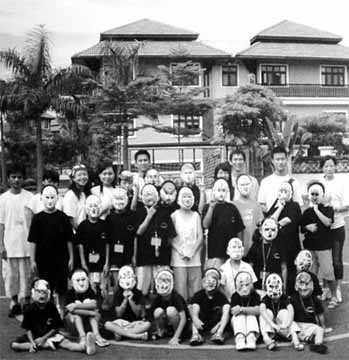
The story is that in the city of Yinchuan, municipal administrators went to check out the business operations of stores outside a market for construction materials. During the process, the team captain was assaulted violently. There should be a photograph accompanying this story. But when you go to that NetEase link, there is no photograph.
According to Boxun, the photograph was removed from NetEase because the netizens' comments were heading in the wrong direction:
- When the municipal administrators attempted to remove the equipment, Shandong Machinery's Ningxia office manager Shi's wife attempted to stop them on the grounds that there was danger from a crane in operation in the area. During the argument, there was contact with Shi's wife and the municipal administrators and Shi's son picked up a brick and bashed the captain's head from behind. What wonderful People's municipal administrators! They are always concerned about public safety!
- The Yinchuan municipal administrators are hooligans who abuse their authority and take people's money and property by force. I personally witnessed them beat some university students who were soliciting people to hire them as tutors. The municipal administrators said the university students were disturbing public order and fined them 50 yuan each. The pitiable university students were assaulted and their money taken away.
- The photo was wonderful -- the young hero, the crying relative and the pig-like municipal administrators. The constrast is obvious and the meaning is clear. This is a great photograph!! It should be saved. This photo will win an international prize. You just wait and see.
- Why was the photo delted? Have the expert scholars and media lost their stances and social conscience and become running dogs?
The World Health Organisation (WHO) refused on Monday to consider membership for Taiwan, agreeing at its annual assembly with China's position that only sovereign states could join. On the opening day of this year's assembly a small group of countries that recognise Taipei went a step further and pushed for a debate on membership for Taiwan. The call was rejected by 148 votes to 17.
Taiwan has diplomatic relationship with 25 countries. So which 8 went missing on that vote? And what were their reasons? Here is the roll call (via China Times):
- Vatican -- not a member of the World Health Organisation
- Dominica -- lost right to cast vote due to delinquent payment of membership dues
- Saint Lucia -- did not send a representative to annual assembly this year
- Haiti -- did not cast vote although the representative was present (note: Haiti needs the UN peacekeeping force and will therefore typically not cross China)
- Nicaragua -- absent during voting (note: had been noncommittal all along)
- Panama -- absent during voting (note: had been noncommittal all along)
- Marshall Islands -- the representative was present during debate but had 'sudden attack of diarrhea' while votes were being cast
- Costa Rica -- the representative apologized for misreading the language of the vote and therefore cast the vote for "Nay" instead of "Aye"
When former Beijing marathon winner Ai Dongmei fell into hard times, another former champion athlete Zou Chunlan came to offer her help in the form of 1,000 yuan. Previously, Zou Chunlan had fallen into hard times as well and was working as a foot bather in a sports scandal. However, Zou is now operating a dry cleaning store "that makes 10,000 yuan a month."
Is that so?
When asked by this reporter, Zou Chunlan smiled and said that business is okay. But her husband Zhou Shaocheng said, "Our entire family assets consist of only 2,000 yuan. Can you believe that?" He went through the accounting: The fixed monthly expenditures are 3,333 yuan for rent, 1,200 yuan for utilities, 2,000 yuan for wages plus other expenses such as equipment. The monthly total expenditure is therefore 7,000 to 8,000 yuan. In order to net 10,000 yuan per month, they need to make 600 yuan per day in revenue for monthly total revenue of 18,000 yuan. This is completely impossible. "Let me put it this way. We have worked here for eight months. We are lucky if we can pay for all the expenses and not use up the capital. When things go well, we are lucky to have a thousand or so yuan at the end of the month."
Zhou Shaocheng said that he gave out those figures when interviewed. But when he checked the newspaper the next day, it was written: "Zou Chunlan now has money." His "true" words and "factual" words seldom appear in those newspapers. Some reporter told him privately that it was because the people "upstairs" said not to say "anything unpleasant."
Meanwhile, Zou Chunlan had received a "press release" before a certain high-profile newspaper showed up to interview her, to make sure that she would not be saying the wrong things. Meanwhile, Zhou Shaocheng's true words are not reported by the local media.
Who is behind the Ai Dongmei affair? Zhou Shaocheng said that a certain leader called to tell Zou Chunlan to go to Beijing "to deliver money" to Ai Dongmei and that was how that authoritative media published the story. The whole thing was therefore a show. Zhou Shaocheng said: "The dry cleaning shop was paid for with more than 200,000 yuan from someone. When they talk, do we dare not to listen?"
Is everything in China just hype and lies? No, because this story was just busted on the Internet.
Here is a random excerpt from a book entitled <Comrades in Love: The History Research Project of the Oral Narratives from Twelve Hong Kong Gay Comrades>:
That first time, I ejaculated three or four times. It even took place in the bathroom on one occasion. We kissed for a long time before we took off our clothes. We first took our tops off and then we took off our pants a while later. There seemed to be a flow. I have foreskin which is very sensitive and I don't usually turn it over ...
The various chapters in the book recorded the growing up of the interviewees and details of their love-making. If this kind of language should appear in the Chinese University Student Press and the Obscene Articles Tribunal were to lay their hands on it, it would be Category II Indecent.
Who published this book? The project coordinate/publisher is the Hong Kong Sexology Institute and the organizers are Hong Kong Rainbow and the Hong Kong Non-standard Educational Research Center. The interviewers and writers are 15 Chinese Unviersity students at the Cultural and Religious Studies Department. Here is the most interesting part: the book is financially supported by the Equal Opportunity (Gender Preference) Aid Program of the Hong Kong SAR Government's Home Affairs Bureau. The copyright page states explicitly that "the purpose of the Equal Opportunity (Gender Preference) Aid Program is to promote equal opportunity activities for persons with different gender preferences."
Thus, for the same sexually explicit material, one government unit will ban and punish it while another government unit will support and reward it.
In the Chinese language, the word for official is 官 and it is often said that it has two 口 characters ("mouth") inside. The mouths are split personalities in that one mouth will say "Lewd!" while the other will say "Awesome!"
(Ming Pao) Yesterday, Oriental Daily pointed out that Ming Pao re-published the survey questionnaire used in the February and March editions of Chinese University Student Press in its Sunday lifestyle section. The contents of those two issues may be classified by the Obscene Articles Tribunal as Category II Obscene Material. As such, Ming Pao's re-publication is a direct challenge of the Obscene Articles Tribunal and they may be punished as well.
Related Link: 所有有關中大學生報情色版之報告及文章 Blogspot website with copies of all the relevant original materials. P.S. It may be a crime to link to that page which contains Category II Indecent material.
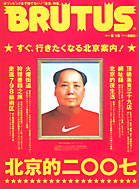
Chinese police on Saturday arrested a man who allegedly tried to set fire to the giant portrait of Chairman Mao Tse-tung in Tiananmen Square, the official New China News Agency reported. A man threw a homemade object at the painting of Communist China's founding father, causing smoke and fire to break out briefly on the bottom left-hand corner of the iconic portrait, which looms above the entrance to the Forbidden City.
Workers in a crane climbed up to sweep Mao's right shoulder with water and a broom. A black burn mark remained on the Great Helmsman's trademark gray suit. A new portrait was scheduled to be put up Saturday night, the news agency said.You can even add the photograph from Reuters:
Who was that man? That is for the Chinese government to know and Xinhua to report. You can repeat this report (with your qualifications, if you need to):
The suspect was identified as Gu Haiou, 35, an unemployed man from the far western Chinese city of Urumqi, capital of the restive Xinjiang autonomous region, home to ethnic Uighurs. He apparently had arrived in Beijing a few hours before tossing the object, authorities say.
Police immediately captured Gu and cleared the area of visitors.And then you can extrapolate from this single incident:
Gu's fate is unclear. Counterrevolutionary activity is no longer a formal charge. But political offenders can be detained under other charges ... The Beijing Public Security Bureau told the New China News Agency that Gu had a history of mental illness. Though the suspect's motivations may never become public, China is a country brimming with discontent rising from a growing income gap and widespread official corruption. The government reported 87,000 illegal disturbances in 2005.
There are other reports along the same line:
(China Information Center) The CIC reporter has learned the various Beijing offices of mainland Chinese media received urgent notices not to report on the matter of the Mao portrait. However, the notice did not provide any details about the case. [Comment: The correct report should be that the media were instructed to carry only the official Xinhua report and not file anything of their own. Why? Because they know that this is international news and can be controlled but not suppressed.]
(Apple Daily) According to renowned mainland Chinese dissident Chen Ziming (who was regarded by the government as a 'black hand' behind the 1989 democracy movement), this arson attempt on the portrait of Mao Zedong shows that public discontent is at a boiling point. If the Beijing authorities mishandles this affair, there could be trouble.
I don't know how much can be read into this incident. That is, are 'reporters' supposed to engage in 'coming collapse of China'-speculations every time that they file something? The problem with invoking the '87,000 illegal disturbances' every time is that this statistical number will lose potency and appeal from over-usage (see Statistics of Mass Incidents).
In this report, where would you draw the line on what you need to know as a consumer of news? (1) Just the facts, please; (2) the Xinhua description of the perpetrator; (3) the coming collapse of China with the rising number of "illegal disturbances"?
Personally, I accept (1); I accept (2) with the qualification that it came from Xinhua and no other version is allowed inside China; and I wish to be spared from (3) because this is not news reporting.Related Link: First Pickled Mao, now Barbecued Mao Beijing Newspeak
The story began when reporter Xiong Chuan wrote a negative report on June 29, 2006 about China DR TV (a television shopping channel). The article was carried by many websites and this led some consumers to demand refunds on their products. On July 4, the company reported an extortion case to the Shanghai police.
On July 5, the company contacted Mao Yining, a former colleague of Xiong Chuan and asked for assistance to report the reporting. According to the company, Mao Yining demanded 900,000 RMB at first but was talked down to 400,000 RMB. On July 7, the company handed 150,000 RMB over to Mao Yining. Xiong Chuan has not received any share of that money. Instead Mao Yining deposited the money in his own bank account and played the stock market with it. On July 27, the company said that Mao Yining demanded the remaining 250,000 RMB. When Mao and Xiong showed up to pick up the money, they were arrested by the police.
What is the flaw here? The company reported extortion to the police on July 4 before it made contact with Mao Yining the next day (and the company has not contacted Xiong Chuan directly). What extortion? You cannot report extortion before it happens. You can argue that the two persons were guilty of accepting bribes and the two defendants admit that they were greedy. But there was no extortion, just entrapment.
The Obscene Articles Tribunal, consisting of a Presiding Magistrate and two or more adjudicators, carries out two main tasks with respect to articles and matter - classification and determination.
It classifies articles submitted by such parties as authors, printers, manufacturers, publishers, importers, distributors, copyright owners or any person who commissions the design, production or publication of the articles concerned. Those who commission any aspect of an article may also submit that article for classification, as may the Secretary for Justice or any authorised public officer.
Additionally a court or magistrate may, in the course of proceedings, refer an article or matter to the Tribunal, asking it to determine whether:
- the article is obscene or indecent;
- the matter is indecent; or
- the publication of the article or the public display of the matter is intended for the public good.
Under the control of Obscene and Indecent Articles Ordinance, the Tribunal's power to classify articles effectively provides society with an effective means of interpreting in practice the notions of obscenity and indecency. Indecency is here deemed to include violence, depravity and repulsiveness.
In arriving at the determination and classification of an article, the Tribunal is called upon by law to take account of:
- the standards of morality, decency and propriety that are generally accepted by reasonable members of the community;
- the dominant overall effect of an article or matter;
- the persons, classes of persons, or age groups intended or likely to be targeted by an article's publication;
- in the case of matter publicly displayed, the location of such display and the persons, classes of persons, or age groups likely to view it; and
- whether the article or matter has an honest purpose or whether instead it seeks to disguise unacceptable material.
The Tribunal can classify an article as follows:
- Class I - neither obscene nor indecent;
- Class II - indecent; or
- Class III - obscene.
Adjudicators form a panel and are appointed by the Chief Justice. They serve for 3 years and are eligible for re-appointment. To ensure that the standards used by the Tribunal are representative and as close to social norms as possible, adjudicators are appointed from all walks of life and sectors of society and come from different age groups, professions and occupations. Anyone wishing to become an adjudicator should contact the Communication and Technology Branch of the Commerce, Industry and Technology Bureau for details (Tel: 2189 2222).
Who are these nameless unelected, self-nominated people? Why are this small circle deciding what can be published?
The most outspoken magazine in mainland China is Yanhuang Chunqiu (炎黃春秋), which has published many articles in support of political reform and democracy recently. The most well-known one was <The Model for Democratic Socialism and the Future of China> by former Renmin University vice-president Xie Tao (謝韜). That essay pointed out that Marx and Engels had abandoned the fantasy of communism in later years and advocated democratic socialism instead. This made democratic socialism the mainstream of Marxism, as realized in Sweden and other northern European countries.
In the most recent issue of Yanhuang Chunqiu, there is an essay by Lu Dingyi (陸定一) on the totalitarian system of the Chinese Communists. In 1945, Lu Dingyi was appointed the Central Propaganda Department director. He was a dedicated disciple of Mao Zedong and an active accomplice in controlling opinion. He eventually entered the Central Politburo and fell only during the Cultural Revolution. According to Lu Dingyi, "when news serve politics, it means lying to the people above and below. That means raping public opinion. This is bullshit journalism." Under the president system, commentary is tightly controlled and party members are not subject to monitoring. This results in corruption being more and more severe.
"Even the anti-corruption organizations are lead by the Party and have to obey the Party. If the Party leaders are corrupt, then who can check them ... self-discipline alone cannot solve the problem of corruption within the party. During the fight against corruption, they are both the actors and the judges. In management science, this will be a functional dysfunction ... for the corruption problem within the Party, the authority to judge and monitor has to be placed on the outside. From a foundation of self-discipline, public opinion monitoring will bring it up to a higher level ... in a market economy, trading power for money or monetarizing power are common phenomena. It can only be checked by increasing the transparency of the fight against corruption and monitoring by public opinion."
Frankly speaking, Lu Dingyi's views are nothing insightful or new. We have read many essays that are even more insightful and convincing. But when it comes from an old revolutionary and ideological expert who had been a follower of Mao Zedong for many years, it will be interpreted and treated differently.
This is a technical issue that might interest statisticians. The issue has to do with weighting the sample in the survey portion of the Democratic Progressive Party primary election for the Taiwan parliament.
Suppose this was a general population survey of the entire adult population. It is general knowledge throughout the world that telephone surveys experience differential response by population sub-groups. For example, young people are less likely to be at home to take and coooperate with telephone calls; poor people are less likely to have telephones; etc. The differential responses rates will show up by monitoring the demographic distribution of the sample compared to the population (according to the census). For example, the sample shows 8% male 18-29 but the census says 10%. Usually, the sampling statistician would weight the sample. For example, each male 18-29 is now worth 10/8 = 1.25 persons and so on. This is accepted practice around the world.
In the DPP primary election, there is a wrinkle. Instead of surveying the general population, the DPP is filtering out the pan-blues (those who identify with the Nationalist and People First Parties). That is their prerogative. But they have to deal with the statistical consequences.
As a survey sample, this one will experience differential response rates like any other survey sample. Therefore, they should weight the sample to correct the biases. But to what values? In the general population, the percent of male 18-29 might be 10%. But what is the percent in the sub-population with the pan-blues being filtered out? The government census does not enumerate this. The percent of male 18-29 could be 8%, or 12%, or whatever.
So now there is a dilemma. If they don't weight, they are accepting the biases from the differential response rates; if they weight (for example, to the distribution in the general population as a whole), they may be introducing a different sort of bias. There is no clear correct answer here. The numbers can be produced as weighted or unweighted, and they will be different. Whichever number is chosen, it will be different from the other one. So someone is going to gain and someone else is going to lose as a result. This will be a point of contention. But the rules should be spelled out beforehand to remove the accusation that the choice was made post facto to favor certain candidates.
Addendum: The particular technical issue is not specific to DPP/Taiwan/whatever. Previously, in Using the Internet as a Survey Tool, I used the example in which a survey was restricted to a sub-population (namely, Internet users) and showed that the resulting numbers are biased, with or without weighting. There is just no good solution here, but it is better to be honest up front about what is happening.
While still under the intense attention from inside and outside of China, Liu Binjie replaced Long Xinmin as General Administration of Press and Publications director. According to <News Publishing News>, Liu Binjie emphasized in his inaugural speech: "We must use wisdom more and power less often" in order to elevate the quality of adminstration and enforcement.
Mr. Liu's speech is refreshing to hear.
One must admit that the relationship between power and wisdom is something that we have seldom examined. Everybody has a weakness of being corrupted by power. If you have power, then you are high above and you lose your sense of position, awareness, humility and respect as an ordinary person. This can easily happen in the absence of a system of checking. The arrogance of power lacks wisdom in its content, and it becomes a brute force that conflicts with commensense and humanity. The exercise of this power will result in doubts and resistance about its legitimacy.
... Mr. Liu Binjie's speech reflects the self-awareness of power to a certain extent. It is far from enough to check power through its self-awareness alone. World history has shown that the proper way is to build a complete system to hold power in check. Once the idea is accepted, the urgent task is to figure out how to implment the theory, make suitable arrangements within the system and let the public enjoy the fruits of political wisdom in their lives, especially in the realm of press and publishing.
The mass incident in Gurao town (Shantou city) was reported widely in the overseas media. But not a single mainland Chinese media outlet dared to say anything about this. At this time, if you enter 'Shantou'+'Gurao' in Baidu, you get nothing.
So I entered '汕头'+'谷饶' (='Shantou'+'Gurao') in Baidu and I have four result. From May 8 to May 11, Zaobao from Singapore has filed a report on the situation in Shantou. The inference here is that Baidu is not filtering on 'Shantou'+'Gurao.' Rather, it is the mainland Chinese media outlets that are conducting self-censorship and when Baidu searches the websites of these media outlets, the subject does not exist.
The other aspect is this. When you look for 'Shantou'+'Gurao' at Google.cn, there is absolutely nothing (not even the Zaobao reports) but there is the footnote to the effect that some search results have been removed to comply with local laws. Does that mean that Google.cn is filtering on 'Shantou'+'Gurao'? No, that is not necessarily true. When you look for 'Shantou'+'Gurao' at Google.com, there are many more results from the so-called 'overseas hostile forces.' Thus, Google.cn probably has a list of these websites and will remove search results from them.
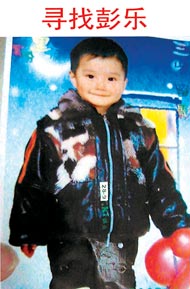
In Shangbao village (Gurao town) where the most serious incident occurred previously, the villagers have changed their target given that the officials have gone into hiding. A supermarket owned by a Fujianese had been renting land upon authorization by an allegedly corrupt village official. Several hundred villagers surrounded the supermarket on the evening of May 9, and left a threatening note: Close down the business within 5 days or "assume the responsiblity about what happens next."
The incidents have also spread from Gurao town to neighboring Tongyu town, where Shenling village party secretary Xu Jiayu is accused of selling land privately to many enterprises. Yesterday, several hundred villagers surrounded the village government office. The village government brought in about fifty unidentified men to face off with the villagers. No violence occurred. But the villagers turned around to a four-storey factory that was allegedly illegally using public land. The villagers smashed the glass windows in the factory and issued a warning that the factory must move away by May 15 or "assume the responsibility about what happens next."
What does the Chaoyang district government have to say, given that these towns and villages are within its supervision?
A female worker at the Shatou city Chaoyang district government told Ming Pao by telephone that the district government is paying a high degree attention to the "violent incidents" in Gurao town. Since May 1st, the district party secretary and mayor have gone to the town. She decilned to discuss the corruption of the town and village officials directly, and only said: "This is a historical problem that cannot be solved in a couple of days."
What does the Chaoyang district public security bureau have to say? (Ming Pao)
They posted wanted posters for two village cadres suspected of illegally selling land and misappropriating public funds.
In Hong Kong, a 48-year-old man posted some hyperlinks leading to pornographic photographs at an Internet discussion forum last November. A citizen complained to the Television and Entertainment Licensing Authority which referred the case to the police. In March this year, the police found that the man posted eight additional hyperlinks to the same discussion forum. The eight linked photographs were deemed by the Obscene Articles Tribunal to be Category III obscene material. Therefore, the police went to the man's apartment in Shum Shui Po and placed him under arrest.
At the trial, the man's lawyer pleaded that the photographs were just ordinary pornography that did not involve children or animals, that the defendant was unaware that he was doing something illegal, that the defendant did not derive any economic gain and that he was repentant after his arrest. As a result, the judge decided to fine him only HK$5,000. The police stated that they respect the decision of the court. They hope that the case will have a cautionary message for citizens.
This is the first time that anyone has been found guilty of distributing obscene materials via hyperlinks on the Internet.
At 案內人隨筆 (Wanszezit), the blogger wrote: "When I saw this report, my first reaction was: 'There has to be a mistake.' Since when has Hong Kong turned into mainland China? And have I broken the law already? I seemed to have linked to YouTube, which has much more in the way of pornography than just a few erotic photographs?! ... " If you search for 色情照片 ("erotic photographs"), you will get 1,570,000 results on Google and 9,150,000 results on Yahoo!. If the penalty for eight hyperlinks was HK$5,000, how much bigger would be the penalties be for Google/Yahoo!? Please bear in mind that Google/Yahoo! have bestiality/pedophilia links (just search Google-Images for the keywords 'bestiality' or 'pedophilia' yourself-- it is apparently a crime to have hyperlinks), they must know that this is illegal, they are deriving economic benefits and they are not repentant.
On April 24, many stock investors came across an "editorial from the People's Daily" -- "Since 2005, the stock market has risen back gradually. After 2006, there were sharp rises. From 2006 to 2007, the Shanghai index rose by 300% and the Shenzhen index rose by 340% ... we should have a keen understanding of the situation of the stock markets in our nation ..." Within ten minutes after the market opened, many investors sold their stocks. The index fell by more than 50 points within 10 minutes. Thereafter, trading was volatile throughout the day. April 24 was the only day in which the stock market index ended on the down side.
On April 24, a reporter called People's Daily for confirmation. The telehpone operator at the editorial department seemed to have received many inquiring calls already and she answered before the question was posed fully: "No such thing. That's just a rumor." Another reporter also found that the purported People's Daily editorial contained many data mistakes. For example, some of the data came from the early 1990's with even references such as "the interest rate last year for fixed deposits was 10.98%."
According to one expert, the stock market can no longer by influenced by some editorial essays. If a People's Daily editorial preceded the fall of stock prices, it would be because the essay is just stating the factors of the stock market such as capital and policies that should affect stock prices. On December 15 and 16, 1996, People's Daily published two editorials that reminded people about the risks in stocks. As a result, the Shanghai stock index fell from 1248 points on December 12 to 905 points on December 17.
[in translation]
When I first came to Taiwan to start <Apple Daily>, I first looked for the vision behind this business deal. I carefully investigated and studied the situation of the newspaper industry in Taiwan and the views of the decision-makers in order to discern a meaning. At the same time, I also carefully investigated and studied the newspaper market in Taiwan as well as the opinion, needs and expectation of the readers about their newspapers. Then I tried to combine the meanings from these two aspects.
I went over these two meanings again and again and I contemplated the contradictions. At the time, I was thinking: How can I resolve the contradictions? I know that if I can find a theoretical solution to the contradictions, I will have an approximate business model and direction for <Apple Daily> in Taiwan.
Then I continued to think about the impact on the needs and expectations of the readers if this theoretical model works. What kinds of changes will it cause in the market? What new meanings will arise as a result of the changes? If I can combine the two meanings into one, I will have a vision with which to being <Apple Daily> in Taiwan.
It is not enough to have vision. I must have firm confidence in this vision. Without the firm confidence, it means that I am not very optimistic about the future of the business. If a garment manufacturer gets into the real estate business, can you say that it is optimistic about the prospects of the garment industry? If so, why would he get into real estate instead?
But the vision is not static and unchanging. We need to revise this vision constantly as a result of business scale, lessons of success and failure, market conditions and customer needs. The vision is alive, because business development and market changes are alive.
For example, when I founded <Apple Daily> in Taiwan, I did not think that the Internet would pose a threat to newspapers. I did not think that more and more young people would read the electronic news instead of purchasing newspapers. <Apple Daily> has succeeded in Taiwan, and this means that our original vision was correct. But with the threat from the Internet as well as changes in the market conditions and reading habits of young readers, we need a new vision to direct the operation and development of our newspaper.
What is this new vision? Is this to combine the print newspaper and the online newspaper into dual media? What are implications of this change for our existing business? What are the chain effects of the change to dual media for the market and the readers? What is the meaning that will emerge after these changes? What are the implications of this new meaning for the future of our newspaper? I am thinking through this series of problems, and I hold that I can come up with a new vision for the operation and development of our newspaper.
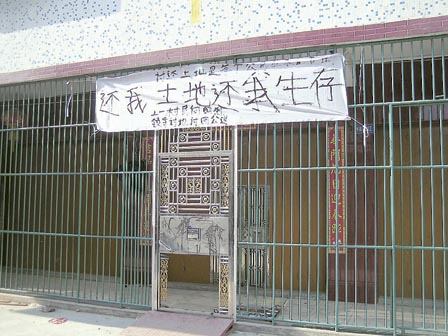

News that Chinese Politburo standing committee member and State Council Vice-premier Huang Ju is seriously ill has been broadly circulated during the past days. Yesterday, there was even news that Huang Ju had passed away at the "301 Hospital" in Beijing. The foreign news reporter quoted the information spokesperson at the State Council as saying that there is no basis for saying that Huang Ju is ill, there is no way for outsider to tell.
Huang Ju is ranked number six in the Politburo. But he has been frequently missing from public appearances of the top leaders since the end of the year before last. This had caused outsiders to speculate whether he was ill or in political trouble. Last March during the two Congresses, the government spokesperson confirmed that Huang Ju was ill and then the speculations stopped. But the nature of his illness had never been specified. Overseas media reported that Huang Ju had prostate cancer, but there was no official confifrmation.
During the two Congresses this year in March, Huang Ju made two appearances: at the opening of the National People's Congress and the conference of the Shanghai delegation. These appearances suggest that Huang Ju is in reasonably good health. Now two months later, he is rumored to be seriously ill or even dead ...
There is plenty more speculations that can be made here. But the Ming Pao report cuts to the point with this question:
The information officer at the State Council is saying that there is no basis for the overseas media reports. How about telling the truth to the media in the first place?
Related Link: Huang Ju �not dead� Positive Solutions
... Tuesday's trouble broke out when more than two dozen lawmakers from the ruling Democratic Progressive Party surrounded the dais in an attempt to prevent Wang Jin-pyng of the main opposition Nationalist Party from speaking. ... Responding to the DPP's move against Wang, dozens of Nationalist lawmakers charged the DPP wall, pushing, shoving and exchanging blows with their rivals. Lawmakers from the two factions climbed on each other's shoulders in a desperate attempt to gain advantage in scenes that were probably more appropriate for unregulated football scrimmages.
One of the main protagonists was Yen Ching-piao, a Nationalist-aligned independent lawmaker who has been convicted of corruption, attempted murder, illegal possession of firearms and attempting to pervert the course of justice, but is free pending an appeal. Yen, a short, squat man with owlish eyes, used his large physical presence to try to create a corridor to Wang, but to no avail.
The last major brawl broke out in January, also over Nationalist attempts to change the composition of the Central Election Commission so it reflects the parties' legislative representations. At present, members of the commission are nominated by the government and approved by the president. The opposition called the commission's impartiality into question amid months of legal wrangling following President Chen Shui-bian's narrow victory in the 2004 presidential election.
YouTube: 台灣立法院委員全武行打成一團
During the recent DPP primary election, Huang Chao-hui was supposed to be runnng against Yao Wen-chih in the fourth district of Kaohsiung. But negotiations resulted Yao going to the first district instead. Therefore, there was no election in the fourth district.
On primary election night, SETTV began to report on the vote counts across Taiwan. For the fourth district in Kaohsiung, it showed that Yao Wen-chih had 3,002 votes compared to Huang Chao-hui's 3,001 votes (see sub-title in the above screen capture). The entire district has only 5,000 or so voters.
Huang Chao-hui said that he called SETTV as soon as he found out. On his first call, he called the general telephone line and was routed around without getting any result. On his second call, he was told that the matter will be dealt with. But it took a long time before the numbers were removed. Still, his supporters were agitated. "It was really weird."
According to SETTV, it used 30 student workers to cover the voting centers across Taiwan, so that these votes could not have been fabricated in the studio. [Note: Fabricated vote tallies are known to have occurred in previous elections because the news television channels need to show higher totals in order to gain viewers who think that they are getting more up-to-date numbers that are closer to the final result.] Thus, this case was an unintentional mistake.
Related Link: The Phenomenon of Vote Reporting in Taiwan (December 11, 2006)
Mobs of villagers in southern China, furious over suspected corrupt land deals, attacked and looted a former official's home and harassed other local cadres, a Hong Kong newspaper reported. Last Wednesday, about 100 villagers in the township of Gurao in the booming Guangdong province surrounded the home of a former village Communist Party leader, Ming Pao newspaper said. "Before we could say much, they barged into the house and robbed it, making off with anything of value. Many things were broken, but it's still unclear how much the losses were," the paper quoted the former official's wife as saying.
... Land prices in Gurao, in Shantou city, were boosted by its famous underwear manufacturing industry - one of China's largest with about 400 factories - and locals had long complained about illicit land sales by officials, Ming Pao said. Another party official was surrounded and threatened by hundreds of angry villagers, who also blocked the entrance to the local government offices. And a third party official was harassed by a mob in the middle of the night, the paper said. A photograph the newspaper said was obtained from an internet posting showed a flipped police car. No arrests were made and more senior officials were dispatched to pacify the villagers.
The Ming Pao report is actually a lot stranger than this Reuters summary conveyed. Here is the additional information (Ming Pao via ChineseNewsNet):
[in translation]
During the May 1st Golden week, many villages in Gurao town saw villagers gathering to demand 'explanations' from cadres. In Huaguang village, the home of former village party secretary Zhang Yuxiong was looted. Zhang's wife informed our newspaper that on the morning of May 2nd, more than one hundred villagers gathered at the house: "Before we could say much, they barged into the house and robbed it, making off with anything of value. Many things were broken, but it's still unclear how much the losses were." Zhang Yuxiong suffered from fright and was still hospitalized yesterday. According to information, the Zhang family called the police afterwards and the local police station sent out investigators. As of yesterday, no one has been detained over the incident.
Gurao town Shangbao village party secretary Zhang Yingyong also admitted to this newspaper that when he and his colleagues went to work recently, they were surrounded and threatened by several hundred villagers. the villagers went as far as sealing all the doors and windows in the office and lit joss sticks to smoke them. The villagers only dispersed after the police arrived. However, the police did not take any action against the villagers. According to Zhang, the police had received orders not to take any action without careful consideration. "They said that it might affect social harmony." Zhang had to go to the hospital as well. Also, the home of Xinxing village (Gurao town) party secretary Zhang Quanlin was broken into in the middle of the night by villagers and the family was disturbed. A police car was toppled by the villagers and tossed into a ditch.
According to information, the party secretaries of the nine villagers in the town have all gone into hiding. They dared not stay in their homes, which are guarded by relatives who are trying to prevent looting. According to information, the villagers are organizing for the Golden Week to end after which tens of thousands of them will proceed to the town government office to demand a solution of the land problem.
Did you ever imagine that there will come a day when the police were summoned to a scene of a disturbance but they refused to take action because "it might affect social harmony"?
My work in environmental protection began in 1996. That year, I read a small article in People's Daily about an old Japanese man coming to China to plant trees in the desert. You know that People's Daily is the official newspaper but it does have this type of report. After I read it, I thought that it was very touching so I sent 100 yuan to that organization. After one month, I called the organization to ask if they have received it. He was very delighted. I asked him how many people sent money to help. I was thinking that the People's Daily was a big newspaper read by many people each day and there must be a lot of people sending in aid. But he simply, "So far, there is only one person and that is you." I felt so sad. Someone from another country came to our land to plant trees to stop desertification. The Chinese people didn't do that. And this touching article was received so coldly!
On March 23, 1996, a friend and I took a train to the farthest spot in Inner Mongolia. The place was so clean and vast. The birds and frogs were so endearing. It was very cold in northern China. It was hard to plant trees because the earth was frozen and hard everywhere. It was like hitting on a rock and your hands hurt. I dug a small ditch and put the seedlings it. Lastly, I poured some water carefully as if I was caressing it in order to make it grow.
Later I found out that there was a Green Students Forum in Beijing. Since they did not know how to conduct activities, I helped them. In 1996, it was the first time that I entered society. In 1998, I participated in the movement to protect the Tibetan antelope. We went to Qinghai and Tibet to fight the hunters. That was an awesome experience. In the tall plateaus, there is altitude sickness. Walking around there is like you carrying 30 kilograms on your back in Hong Kong. You will get headaches and you will throw up. But we worked to protect life. I don't know if there are any animal zoos in Hong Kong. But Tibet is like Africa. It is the home of animals. If you drive there in a car, you are a guest. When we saw the hunters, we started shooting. We had a gunfight. We caught them. That was like ... a battlefield. As men, we have to go to the battlefield and pay with our blood and sweat. Life is very important on the tall plateaus. No one has the right to take life.
In 2001, I started to work on AIDS. The Chinese Communists have politicized AIDS by defining it as the result of "degenerate capitalist lifestyles" such as drug abuse, homosexuality and prostitution. This made AIDS dirty in the sense that the disease was dirty and the victims deserved it. It became very negative in the view of the people. In 2001, the "Blood Disaster of the Central Plains" became broadly known. In Henan, Shandong, Anhui, Hubei, Shaanxi and Shanxi, there were many cases of AIDS communicated by blood. What was the source? The local governments had a policy of getting people to sell blood. Each time, they took 800cc of blood from a person and put it into a piece of equipment that extracts the blood plasma while returning the red blood cells, white blood cells and platelets back to the person. If one person should have AIDS or hepatitis B, then everybody caught it. They didn't even sterilize their needles. It is no wonder that infection occurred. How terrible and remorseless this government is! But after AIDS spread out, the Chinese Communists refused to accept responsibility but politicized it instead. They publicized the use of condoms and so on as if they had not been responsible. In truth, the Communists were the culprits.
Hmm ... after 1989, I began to believe in Buddhism and I became a vegetarian because I believe in the sanctity of life. On Christmas Eve in 2002, I was keeping comapny with a 4-year-old AIDS child. He was lying in bed and holding my hand tightly. I felt as if we had exchanged souls. "I" was looking at Hu Jia standing there and seeing his future. But "I" did not feel anything about myself, because "I" was about to die. That was so hard to take. From there on, I decided that I needed to care, even if it meant my life. So I got into the business of defending the rights of AIDS patients.
Ming Pao received complaints that the Chinese University of Hong Kong student newspaper Student Press had been publishing shocking obscene material, including bestiality, group sex, incest, etc. In February/March, Student Press included a survey that asked the following:
- Do you find love-making boring?
- Did you fantasize about making love with your father, mother, brother or sister?
- Did you ever secretly peek at them bathing, changing clothes, masturbating or making lover?
- What type of person (or animal/thing) excites your lust in the street?
- Have you fantasize making love with the boyfriend/girlfriend of your friend?
- Who do you think about when you masturbate/jerk off?
- Which animal would you like to make love with most of all?
- What is the optimal number of men/women to make love to at one time?
- Which location in CUHK would you like to make love most of all?
- Do you think that it is prejudicial for the dormitories not to allow opposite sex stay overnight?
- Have you ever let your problems in your sex life affect love?Anyone who returns a completed survey will receive a souvenir of one condom (this is a good brand: it is cheap, it won't dry up and it will break easily; if you try it and like it, you can buy your own from then on).
The CUSP chief editor refuses to apologize for the content. He pointed out that sex is a part of life, and the information is there for open discussion. He emphasized repeatedly: "There is no need to be too rigid (毋須太過拘泥)."
Migrant laborers don't get a holiday on May 1st? This does not seem right either legally or logically. In terms of the state's <Labor Law>, the employer should arrange for the workers to get holidays on New Year's Eve, the Spring Festival, Labor Day and National Day. In terms of their status, the migrant laborers who came from the rural areas to work in the cities are urban workers who live off their wages that they earn in the city. In terms of the origin of the International Labor Day, this is the common holiday for the proletariat and workers of the world. The migrant laborers are workers and they are an important part of the productive force. In terms of either the law or policy, the migrant laborers ought to enjoy the right to have a holiday.
For the migrant laborers who have worked hard continuously, they long for a holiday for physical and psychological reasons. But the migrant laborers often do not have the "right" to enjoy a Golden Week holiday like the city workers do. Individual employers mistake the migrant laborers as informal workers who did not sign any labor contract and are therefore ineligible for a holiday. The migrant laborers are also vulnerable and they can only comply instead of resisting and opposing. Therefore, the migrant laborers find themselves in the awkward situation of "if they want their holiday, they have to forego their pay; if they demand their pay, they either give up their holiday or lose their jobs."Getting the migrant workers equal rights for a May 1st holiday depends on employers voluntarily observing the law and the policies and looking after the labor rights of the migrant laborers. But the key is that the supervision of the relevant government departments cannot go "missing in action."
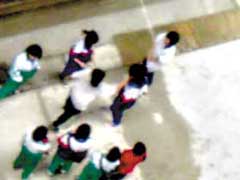
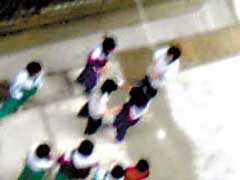
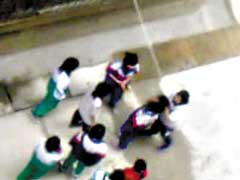
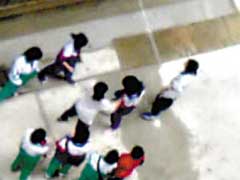
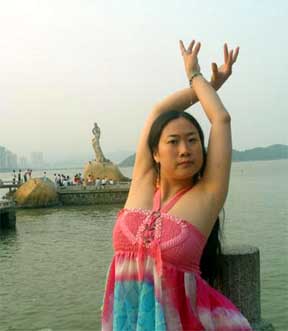



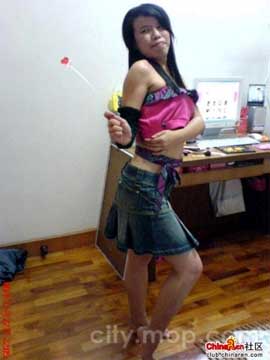
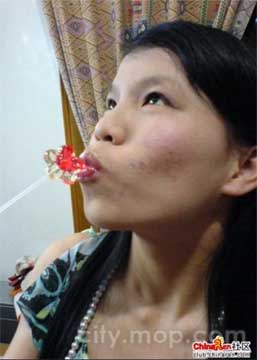
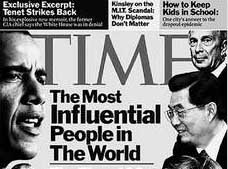
Zeng Jinyan is the online progeny of the protester who blocked a column of advancing tanks during China's Tiananmen uprising in 1989. When Zeng's husband, AIDS and environmental activist Hu Jia, was detained by the Chinese government without any legal proceedings last year, Zeng, now 22, started a blog detailing her experiences and the oppressive activities of the country's secret police. Since then, her blog has been blocked in China, and she and her husband have been harassed, intimidated and subjected to round-the-clock surveillance. But she has steadfastly continued to blog, attracting an international audience with her sardonic style�and her courage. She is Tiananmen 2.0.
Blogs are by nature very personal�an intimate, often ferocious expression of the blogger's passions. This intimacy creates an unusually close bond between blogger and reader. It's why I feel so connected to Zeng, even though we live on opposite sides of the world and have never met�or even spoken to each other. By blogging truth to power, she is planting the seeds of a new�and true�cultural revolution. Let a thousand blogs bloom.
That won't run well in mainland China, right?
With regard to its decision on the complaint against the TV programme "An Autumn's Tale (秋天的童話)" broadcast on 1 October 2006 from 1:18 pm to 3:19 pm on TVB Jade:-
- the downright offensive expressions "f_ _k" and "X家剷" used in the original unedited version of the film were unacceptable for broadcast on television at all times; and
- as regards the other coarse expressions "你x母", "隊x佢", "x街", "x坦", the BA spokesman emphasized that the BA's decision was essentially focused on the broadcasting hours of the programme which was in daytime on Sunday when there might be a large number of children watching television. Material unsuitable for children or young viewers should not be shown when large numbers of children or young viewers might be expected to be watching television, particularly during school holidays.
On the afternoon of May 1st (a public holiday in Hong Kong), TVB broadcast the following clip (see YouTube) in which a demonstrator launched a string of invectives (mostly in reference to the malodorous reproductive organs of the policemen's mothers). What will the Hong Kong Broadcasting Authority say? Consider the circumstances as this was a major event in the process of unfolding and the demonstrator came up unexpectedly. The only way to guarantee that this sort of thing will never happen is to eliminate live television coverage altogether.
Meanwhile, what will happen to children if they see or hear this? Oh, you say that it happens every day in the streets anyway (note: I live on the third floor and I can hear the same type of conversation between the cleaning woman and the security guard at the street level on a frequent basis)? Never mind ...
Three investigations have been launched into police officers' tactics in dispersing a crowd at an immigration rally, where authorities wielded batons and fired rubber bullets into crowds. Among others injured were about half a dozen TV workers. The Los Angeles Press Club has sent a protest letter to Police Chief William J. Bratton. Bratton said Wednesday the public has "an absolute and unqualified right to expect and demand an aggressive review" of the events at MacArthur Park late Tuesday, when officers fired 240 "nonlethal" rounds to clear demonstrators. "The events of (Tuesday), with all (the training) that we do, should not have occurred," Bratton said at a tense news conference.
News images showed police hitting a television cameraman to the ground, shoving people who were walking away from officers and injuries from the rubber bullets. Rally organizers denounced the police action as brutal. "They were pushing children, elderly, mothers with their babies and beating up on the media" said Angela Sanbrano, an organizer.
Bratton promised to investigate the treatment of reporters. "We should never be engaged in attacking anyone in the media," Bratton said.
For YouTube videos, see:
- ABC
- Azteca America
- CNN
- Democracy Now
- Fox
- Fox News
- IndyMedia
- KCAL [*best coverage*]
- MSNBC
- NBC
The comparative analysis here is not about which police force is worse (as if being relatively better excuses the behavior). No matter where in the world, there will be police forces that go out of control either at the individual level, commander level or even higher levels. The true test comes afterwards when the questions of explanations and responsibility come up.
In the case of the LAPD, the police chief accepted that what took place appeared to be wrong and that a review would take place. In the case of Macau, the police force attempted to justify the firing of those five shots in the air. The first statement was that the rounds were blanks. This was withdrawn soon enough, especially with the news that a pedestrian more than 300 hundred meters away got hit with a bullet of the same caliber. The next statement was that the rounds were necessary to rescue a fallen old woman from being trampled by the mob. This was discredited when this woman was located and interviewed by the media (see TVBS and TVBS on YouTube). After this, the credibility of the police was pretty much demolished. They may have another statement but who is going to listen to them anymore? And we have not even come up to the issue of responsibility yet ...
Relevant Link: L.A. Immigration Protest: The Police "Were Relentless. They Were Merciless." Amy Goodman, Democracy Now!Addendum: Lavender Cheung on Learning Political Wisdom from Watching the News:
[in translation]
Edmund Ho finally addressed the incident in which the policeman fired shots. He said that the shots were not fired to suppress the march and that nobody gave orders for the policeman to fire.
In other words, the police officer decided to fire on his own.
Once again, we see what actually happened.
According to the Macau police authorities, the shots were fired because an old woman fell down and a stampede had to be prevented. This reason is hard to believe in itself. Then the media located the old woman the next day and she publicly clarified that she only tried to retrieve her shoe and did not fall down.
Fine, then who told the police that the shots were fired to protect the old woman? It was obviously the policeman who fired those shots.
He tried to use the old woman as the shield and he did not tell the truth. This means that the real reason for the firings could not be disclosed. Perhaps he was afraid, perhaps he was trying to be a hero or perhaps he was indifferent to the safety of the demonstrators.
Perhaps he was too nervous and he forgot that the reporters were filming him. His supervisor was too nervous as well and wanted to shut people up thinking that his say-so would be good enough. So a minor matter has become bigger and bigger.
This shows that politics involves everybody and one is always involved. Everybody needs to have political wisdom. The politically wise people know when to say the right things and do the right things. When someone goes wrong, you should not think that you can cover it up forever.
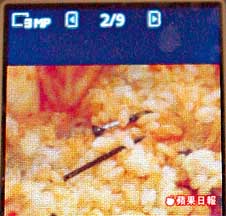
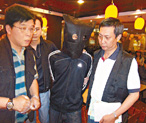
The media in Macau was more muted than their Hong Kong counterparts yesterday in their coverage of the Labour Day march in which police fire on protesters. While Hong Kong papers ran reports questioning the police's handling of the protest, Macau's focused on the force's insistence that opening fire was justified. "It is down to a difference in culture," Chinese University political analyst Ivan Choy Chi-keung said. "Macau is a place dominated by pro-Beijing, pro-government people, and you can see many civil groups are set up and run by these people." He said the disparity could be traced back to the 1960s - while Hong Kong's leftists were sidelined, those in Macau gained the upper hand. Mr Choy, who taught at the University of Macau in the early 1990s, noted that Hong Kong was a more open society. "The big newspapers in Hong Kong are kind of anti-government - cynical about the government," he said. "The two biggest Macau newspapers, theMacau Daily News andJornal Va Kio , are owned by pro-China people and in sympathy with the government."Hong Kong Baptist University assistant professor of communication To Yiu-ming said Macau's media was similar to the mainland's. "They are co-operative with the government," he said. Professor To said the media should allow more space for open discussion of social events, as that was vital for the progress of society. "It is not only about press freedom," he said. "Free flow of information is important. It is a basic human right and it is how a society can walk towards a better future." People would learn about events whether or not newspapers reported them. He said: "There are so many ways to learn the news. People in Macau can also find the other side of a story from Hong Kong media."
Macau legislator Jose Coutinho was saddened by the lack of independence in the Macau media: "They should be more critical, like their counterparts in Hong Kong, so they can bolster their role as the voice of people in society."
What is it about the Macau media then? Here is an opinion column found at InMediaHK.
[in translation]
You are wrong! It is Macau that is the loser.
The May 1st march turned into a disturbance and the organizers claimed that it was a lose-lose situation. This writer thinks: "You are wrong! Macau is the loser."
After the incident, the netizens as well as certain so-called outside "scholars" gave their opinions because they thought that they understand the Macau situation, but nothing that they said was good for Macau. At around 4pm that afternoon, this writer was listening to a non-Cantonese-speaking person describing the scene with a female recording his speech on his side at Rua da Ribeira do Patane. His seemingly "perceptive" analysis of the current conditions in Macau and their relationship to this march almost made me laugh. But if that speech were broadcast, it would definitely be unfunny for Macau.
Concerning the gunfire, one housewife had a good question: "Whose responsibility was it to let an old woman to become the 'vanguard' in front of a demonstration march?"
It was anticipated that the march would turn into a disturbance. Previously, I had questioned just what certain people would do if the pedestrians and local residents were to just silently watch what was going on?
On May 1st, the Taiwan Telecommunications Trade Union workers organized a 5,000 person march on behalf of worker rights. Afterwards, the march leader said that they had prepared petrol bombs. How come they prepared petrol bombs but never used them? Meanwhile, the Macau march demonstrators claimed that they will have a peaceful march but look at what happened? These people were busy condemning others but they never examined themselves.
The disturbance has occurred, but life must go on. The most important thing right now is to think about how Macau will move on. On May 1st, I watched the television programs in Hong Kong and Taiwan and I found out that the people in Hong Kong and Taiwan -- and it must be the same in Macau -- went through the hardships in the 1950's and 1960's to achieve prosperity on the basis of three factors -- they did not complain; when they encountered hardship, they dealt with it calmly; the employers and employees shared all the good and bad.
I believe that these three factors are still applicable today. But you have to note one extra point -- you must be become the election tools for politicians.

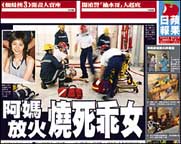
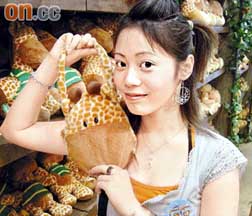
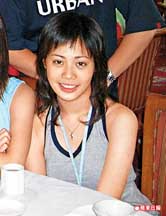
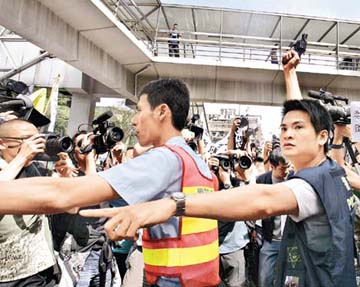
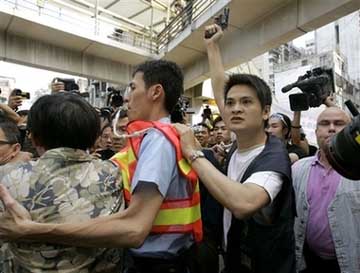
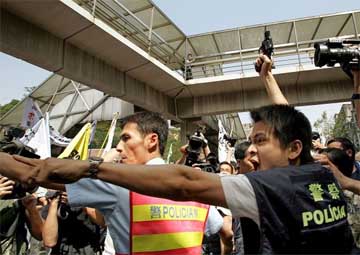
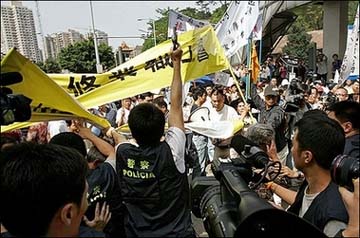
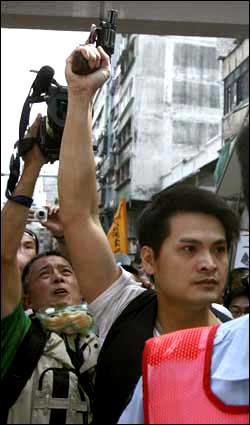
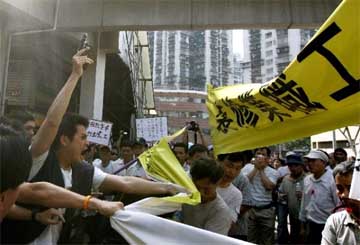
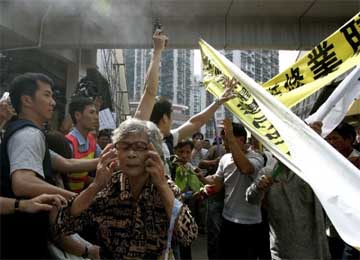
Addendum (Apple
Daily): When the Macau police opened fire into the air, it was
claimed to be in order to help an old woman fallen on the ground. Grandma
Kwok is about 70 years old. At the time, she and several other female
demonstrators were imitating the 2005 WTO demonstrators and holding flowers to
offer to the police. Grandma Kwok has grown children in mainland China and
wants to have them move to Macau for family reunion. Yesterday, she was
interviewed and she said that someone pushed her. However, her family had
advised her not to discuss the matter. Meanwhile, the Family Reunion
Promotion Association chairwoman said that she witnessed the incident -- after
the police officer fired off the shots, Grandma Kwok's shoe fell off and she
bent over to retrieve it.
Addendum (Ming
Pao) Grandma Kwok said: "A total of 12 people including
myself asked to give flowers to the police so that we can solve everything
peacefully. But my shoe fell off and I retrieved it. I don't know
what happened in the end because I left. I was afraid of being stepped
upon. So I left in a hurry. I did not fall down." She
said that there was no chaos at the time. But when she saw the televised
segment and learned what had happened, she found it scary.
Addendum: TVBS interview with Grandma Kwok on YouTube
(in Cantonese).
The police were summoned and the closed circuit video was used as evidence. The man said that he had a few drinks too many that night and thought that the woman was a prostitute. He was upset when the woman rejected his proposition and therefore acted irrationally while under the influence of alcohol. The man apologized the woman and has reached a monetary settlement with the woman and her fianc�. But he also asked the other party to tell the reporters not to continue to report on the case.
Who was the man? He is the deputy director of the Zhangzhou Administration for Safe Production Supervision. What was he doing at the hotel? He was being wined/dined by an organization that was being inspected by his office. This type of activity (namely, participation in any entertainment, sports or travel activity where the expenses are paid by persons or organizations directly under the superivision of the public servants) is strictly forbidden according to the rules of the State Council. Even as the disciplinary committees are investigating, the netizens are also watching for the outcome.
(Ming Pao, April 11, 2007) In order to re-position and re-built its image, the Democratic Party hired a new marketing public relations person Sandra (張嘉淇). She began by speaking to the press, including giving many interviews. This made her person a much bigger story than her future work. In Next Weekly, she said (in translation): "I studied at Maryknoll Convent School. I was discovered as a model at age seventeen. My mother worked at a foreign capital company and earned $20,000 a month. I got $20,000 for making one ad. Each time that I went to the discotheque, I puffed on a cigarette and I told people that I was a model. The girls gawked at me in awe. When the La Salle boys found out that I was a model, they lined up outside the school to wait for me to come out ..."
(Ming Pao, April 18, 2007) As a result of the media exposure for Sandra, there was a rumor that Sandra is the wife of Lee Shiu-man, a member of the Central Committee of the Democratic Party. This was confirmed by many Democratic Party members, including a senior officer. If so, then there may be a conflict of interest (or at least the appearance of such) when a contract is awarded to the spouse of a decision-maker. Ming Pao interviewed Sandra, who told them: "My husband Lee Yiu-man is just an ordinary member of the Democratic Party and not a member of the Central Committee. I only found out yesterday that there is another person named Lee Shiu-man on the Central Committee. By chance, they have the same family and given names. If you don't believe me, you can find your own evidence. You might as well as say that my father is a member of the Central Committee!" She emphasized that unless she was "insane," there was no reason for her to deny this. She said that she was working as a volunteer for the Democratic Party, so there cannot be any conflict of interest.
(Ming Pao, April 19, 2007) Democratic Party chairman Albert Ho and vice-chairman Sin Chung-kai responded to an inquiry from Ming Pao and both made the same three points:
(1) There is a member named Lee Yiu-man on the Central Committee of the Democratic Party;
(2) The public relations consultant Sandra for the Democratic Party is an unpaid volunteer and all expenses for the image project are directly reimbursed;
(3) The Democratic Party will not disclose confidential information about its members, including the marital situations of individuals.
After the above was released, Sandra called Ming Pao in the evening and admitted that the Central Committee member Lee Shiu-man was indeed her husband. She explained that when one reporter asked her about that relationship, she denied it because she knew that her husband did not like media exposure. Once she lied, she had to continue lying. By yesterday, she was feeling very uncomfortable about deceiving the media. After obtaining her husband's permission, she began to call the media to clarify. Will this affair affect her work with the Democratic Party? Sandra didn't think so: "... unless all the reporters boycott me ... but I hope that everybody can forgive me!"(Oriental Daily, April 20, 2007) The Democratic Party has decided to continue using the services of Sandra. Her husband Lee Yiu-man was adamant about resigning from the Central Committee, which the Democratic Party has reluctantly accepted after their attempts to change Lee Yiu-man's mind failed.
Is there an image problem here? Will you trust anything that Sandra says on behalf of the Democratic Party in the future?
[start time: 2:08pm]
Time is slipping by one drop at a time and the second hand has just mercilessly made yet another round on the clock. I am sitting on the sofa at the tea restaurant where I have already eaten the buttered toast. I am not sure that the rude waiter remembers what I ordered. I check the menu and it ought to be correct. The toast comes with either breakfast or afternoon tea, but not with lunch.
There are not many customers at the tea restaurant. Everyone is watching television while they eat food which do not look very attractive. Of course, I realize that you get what you pay for. But at least they could try to make the food look a bit better so that the customers can feel better. I don't think that it should make a lot more time. The rude waiter is back and he slams the glass of lemon tea on my table. I look at him. He looks at me. His look is not friendly at all. I am getting angry, but I am afraid of trouble. So I keep quiet and treat this as a special culture here. Sometimes it is right to think this way because I should avoid troublesome people and things. I laugh bitterly as I think about this.
The second hand has just make another round. Where is the egg-beef rice? I have an interview scheduled later today. What should I do if he asks me about what happened last time? I could tell him that it was a false impression and that I am actually a victim? Or I could tell him a fantastical lie and make me look as if I suffered even more than he did? I don't have a standard answer and I don't know which one is more suitable. Never mind for now, because that is something that will happen later. Meanwhile, I look at the clock on the wall and it is already 2:50pm. I have been sitting on this sofa for more than 15 minutes. It is not too much to ask them to hurry up. I want to say so but when I see that rude waiter, the words do not come out. At least I have a cup of iced lemon tea in my hand. The taste is diluted and there are only two slices of lemon. It is sour but not too sour. But it is better than drinking plain water.
I sit there doing nothing. The upcoming interview makes me slowly forget the pangs of not having eaten all day. I need to hurry up because what if I were late? It is better to leave now. Forget about the egg-beef rice. I can ask them again the next time I come here. I go to the cashier desk and I put down HK$25. I push open the heavy tea-colored door and I leave this tea restaurant with the rude waiter.
[Finish time: 3:11pm. 728 words (in Chinese)]
(Ming Pao via Yahoo! News) This is one of many blog posts from Hong Kong about lemon tea over the past week. "Lemon tea" became an issue because it was the title of the required essay in the Chinese language test for middle school students last week. This became controversial because one particular tutorial school had chosen this subject title as a model essay to practice. Did this tutorial school have inside information? Was this fair to the other students? The issue is less one in which the students simply wrote out the model essay from memory, because the assessor will award zero points upon detection. The problem is the students may have received special tutoring about their use of language and writing techniques for this specific topic. The reaction of the Chinese-language blogosphere has been to show how easy (or hard) it was to write such an essay during the allotted time. The above post contains links to almost one hundred other blog posts.
Related Link: 檸檬茶外傳 腦花花, May 3, 2007
[in translation]
Do you know Tony Chan Chun-chuen (陳振聰)? Do you know the story between Tony Chan and Little Sweetie Nina Wang? <Apple Daily> is looking for all and any material whatsoever between Tony CHan and Nina Wang! If you have any text, photographs or audio-visual materials, please bring them to us! Call 2929-000 or email newsapple@appledaily.com.
Actually, one of the greater wonders is that there has not been any more spoofs (惡搞) about the affair? How about a best fictional story about Nina Wang and Tony Chan? Or a best PhotoShop job?
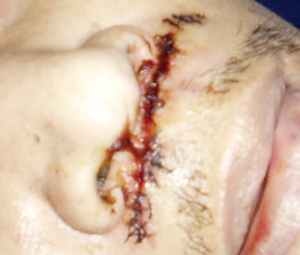
On April 29, the Guilin city government held a press conference and stated that judge Li Chaoyang had died from the "sudden adult death syndrome." During his detention, Li Chaoyang was allegedly under a great deal of mental pressure and he was acting emotionally by screaming in his cell and refusing to return to his cell after exercise. He also attempted to storm out of the detention center. Consequently, the guards used equipment on him (note: handcuffs and leg irons are allowed). On March 28, Li Chaoyang was wearing a restraining device but he nevertheless attempted to make a break while the guards were taking another detainee out. The floor was wet and Li Chaoyang slipped, fell and hit his face on the iron gate, lost a front tooth in the process and bled profusely. Li Chaoyang was subsequently taken to the Xing'an County Hospital where a doctor cleaned his wound and applied stitches.
According to the forensic report from the hospital affiliated with the Guilin City School of Medicine, "the autopsy excluded the possibility that Li Chaoyang had died from violent assault, deliberate asphyxiation, poisoning and so on. Instead, Li Chaoyang had died suddenly in a way consistent with how young and healthy people sometimes die suddenly -- the deceased had been mentally unstable, emotionally distraught, screaming and yelling, and sleeping/eating irregularly. Such behaviors have the effect of inducing sudden death."
So do you trust your lying eyes ...?
[in translation]
In recent days, rumors have been flying about the composition of the Hong Kong SAR administrative team. Democratic Party core members such as Law Chi-Kwong and Sin Chung-kai have been rumored to be recruiting targets for Chief Executive Donald Tsang. But Democratic Party core members stated privately that although Donald Tsang does not object to working with the Democratic Party in principle, the most important thing in political bargaining is still about the strengths. Therefore, the relationship between the democrats and the government will only become clearer after the District Council elections at the end of this year and the Legislative Council elections next year.
According to internal estimates, the Democratic Party will lose at least 10 seats in the District Council elections to be held at the end of the year. In the Legislative Council elections next year, the worse case scenario is that they will lose two seats.
Recently, the democrats are finishing up with the arrangements in the District Council elections at the end of the year and coordinating the candidates from the various political parties. According to information, this effort led by Tsoi Yiu-cheong is winding down and the candidate lists that can be coordinated are more or less done. Except for certain democratic organizations such as the Alliance for Social Democracy which refuse to accept any preferential treatment for current councilors, the political parties have basically determined the candidate lists for the District Council elections on November 18.
According to information, the Democratic Party's preliminary estimate is that they will not be able to have an outstanding performance this year and they will lose at least 10 of their more than 90 district council seats. According to the estimates of some scholars, the Democratic Party will get only about 70% of their previous total of votes. According to information, the Democratic Party had conducted an study that found that in the some of the districts, the current Democratic Party councilors are less than 10% away from their opponents and that the overall image of the Democratic Party is so-so. This meant that this group of councilors may be an endangered species.
According to Democratic Party core members, the party's image had sunken because of the "True Brother" incident but things have now stabilized after reaching the nadir. If they should lose just over 10 seats, then it is fortunate among all the misfortunes.
By comparison, the Civic Party is much more adventuresome towards the District Council. The Civic Party has only five current District Councilors but they hope to enter 40 candidates. The party's candidates such as Tanya Chan and Tsang Kwok-fung are young talents but their opponents could be the local heavyweights of the Liberal Party and DAB and therefore they cannot be too optimistic. It is no wonder that some democrats say that the Civic Party is like a bunch of students carrying book bags on their backs that they believe are parachutes and then leaping down from a high place.
According to analyses by democrats, the Civic Party may have underestimated the probable impact to morale and image if a large number of their candidates fail to be elected. This democratic camp person said that the social image of the Civic Party has been falling continuously ever since the party was formed from the previous Article 45 Concern Group. Even the participation of Alan Leong in the Chief Executive election did not result in any improvement. Under these circumstances, if the party sends out a large number of political novices to run for election who then lose, this will continue the erosion of the public image of the party even further.
This democratic camp core member analyzed that if the Civic Party and the democrats should fail in the district councils, the SAR government may change its political position and then the relationship between the SAR government and the democrats might change. Under the "protection" of the system of proportionate representation, the number of democrats in the Legislative Council is unlikely to change by much. For example, in the Hong Kong island electoral district, the Democratic Party will probably lose one seat. But if the coordination works out, that seat will go to another candidate from the democratic camp. So this election system that was established back then to protect the pro-Beijing political parties has become a protective shield for the democrats. This is enough to make people ponder about ironic reversals in history.
[in translation]
Concerning the phenomenon in which the media and the public regard cases of official corruption as entertainment news, Southern Metropolis Daily issued a caution yesterday in <Private moral judgment cannot replace public monitoring>: when private moral judgment is elevated above public monitoring, the public is unable to get down to the root of corruption; when the issue of the lack of public monitoring is evaded, the possibility of public participation in public monitoring is also being evaded.
If this interpretation is turned around, then we can understand the difficulties and helplessness that the public is facing -- since they do not have the means of getting to the root of corruption and the monitoring system is absent, the media and the public cannot only issue moral judgments. These private moral judgments are the most simple, most direct and least risky.
The media turned one corruption case after another into entertainment news because they wanted to attract more audience eyeballs. But they also have their difficulties. There are so many corruption cases around, but the media cannot offer any remarkable new values or viewpoints beyond making more appeals. I do not mean that the media do not have the capability. Rather, under the present conditions, they cannot point to a political reading of the heart of the matter, especially with respect to what is happening behind the scenes.
The public is enjoying the reports about official corruption as manifested in stories about extravagant lifestyles. In the present system for monitoring the authorities, public monitoring exists only in name. So when the public looks at these cases of official corruption, they can only "sneak a peek" as a matter of curiosity and any serious effort is just like Don Quixote fighting the windmill.
From this perspective, private moral judgment is just a ventilation outlet in the depressing monitoring environment. The media and the public comfort themselves through the entertainment because opinion and public monitoring is weak. Even if they don't like it, they can get some relief from the depression to a certain degree and apply a bit of moral pressure on officials.
Archives